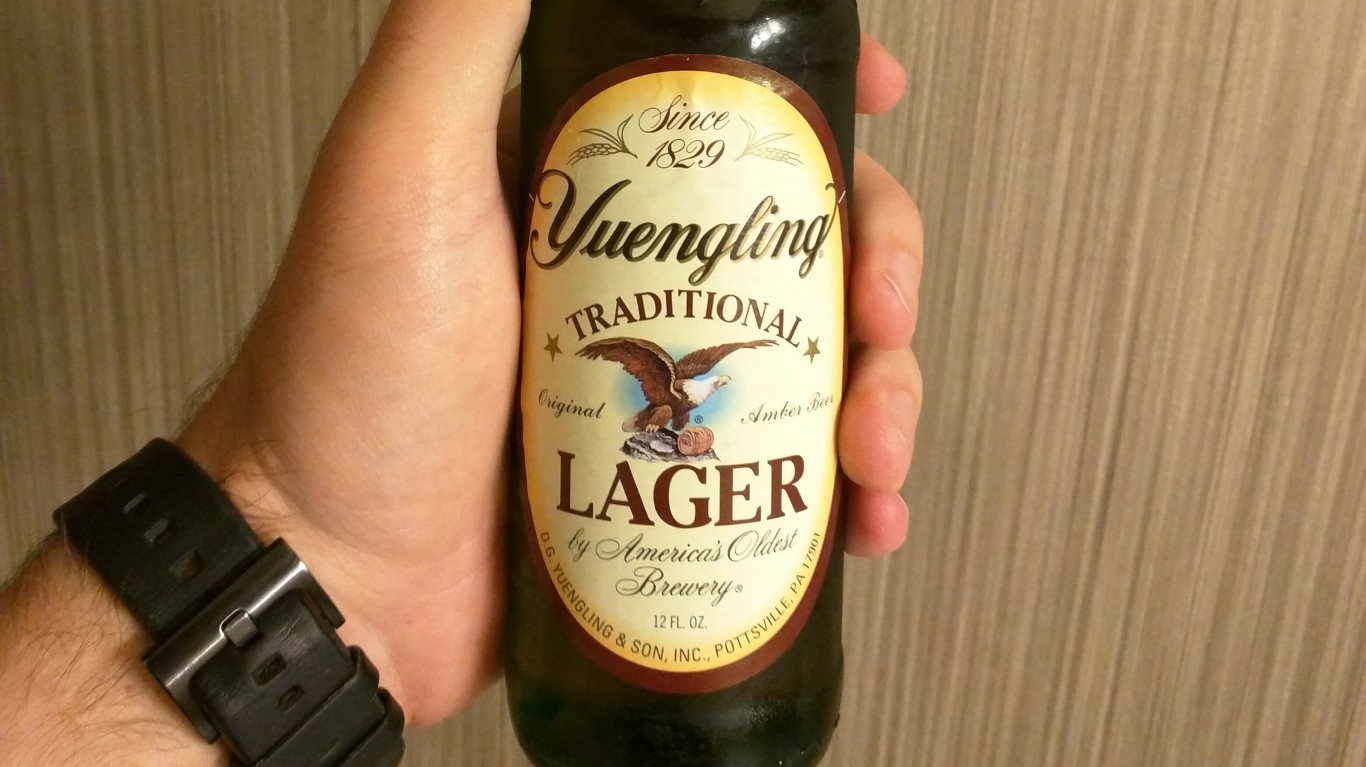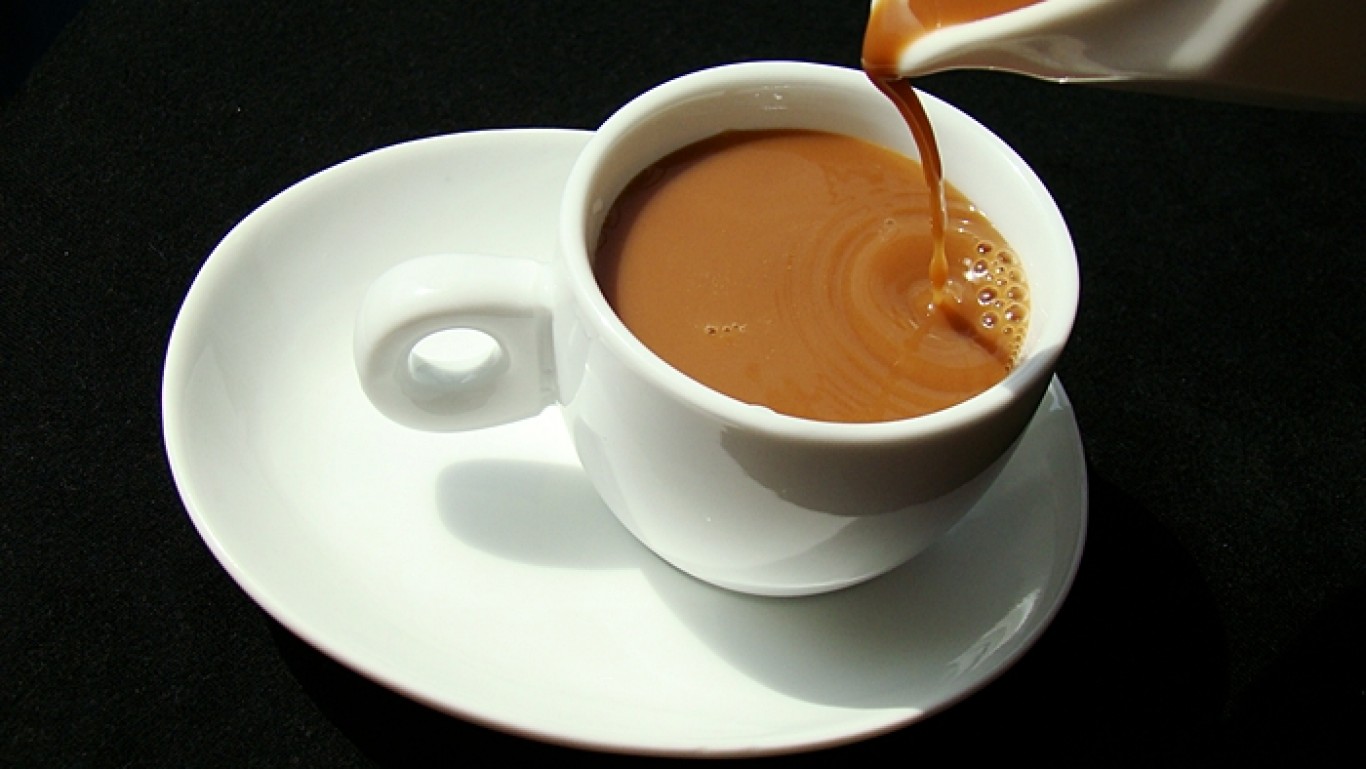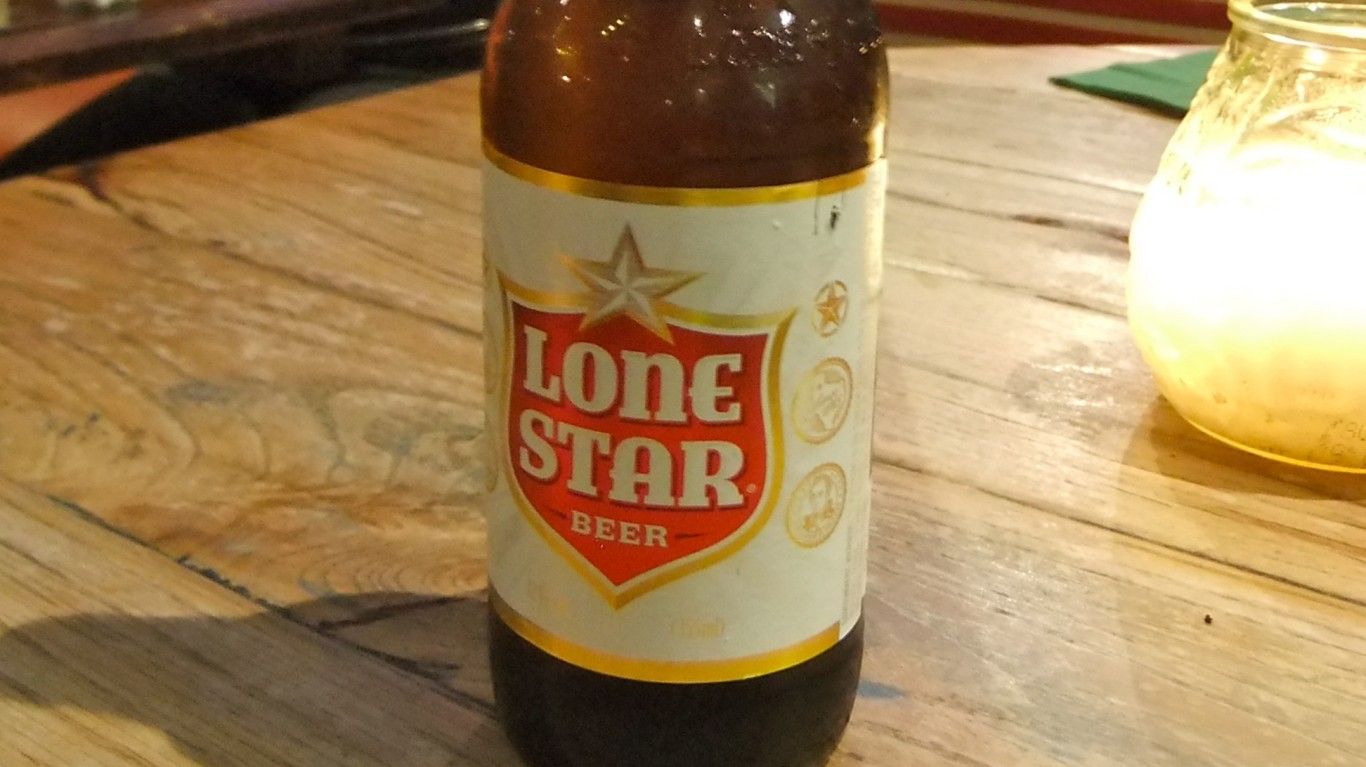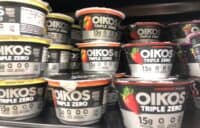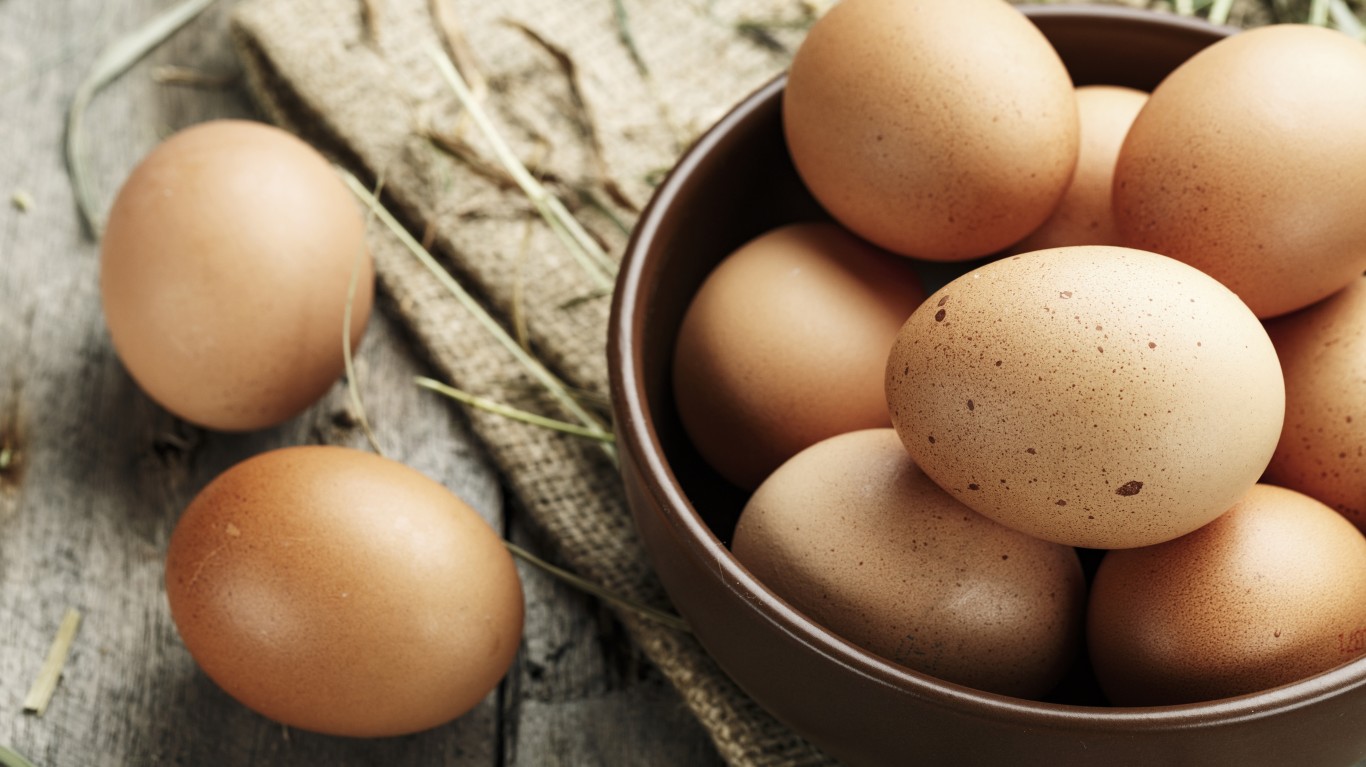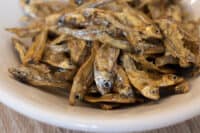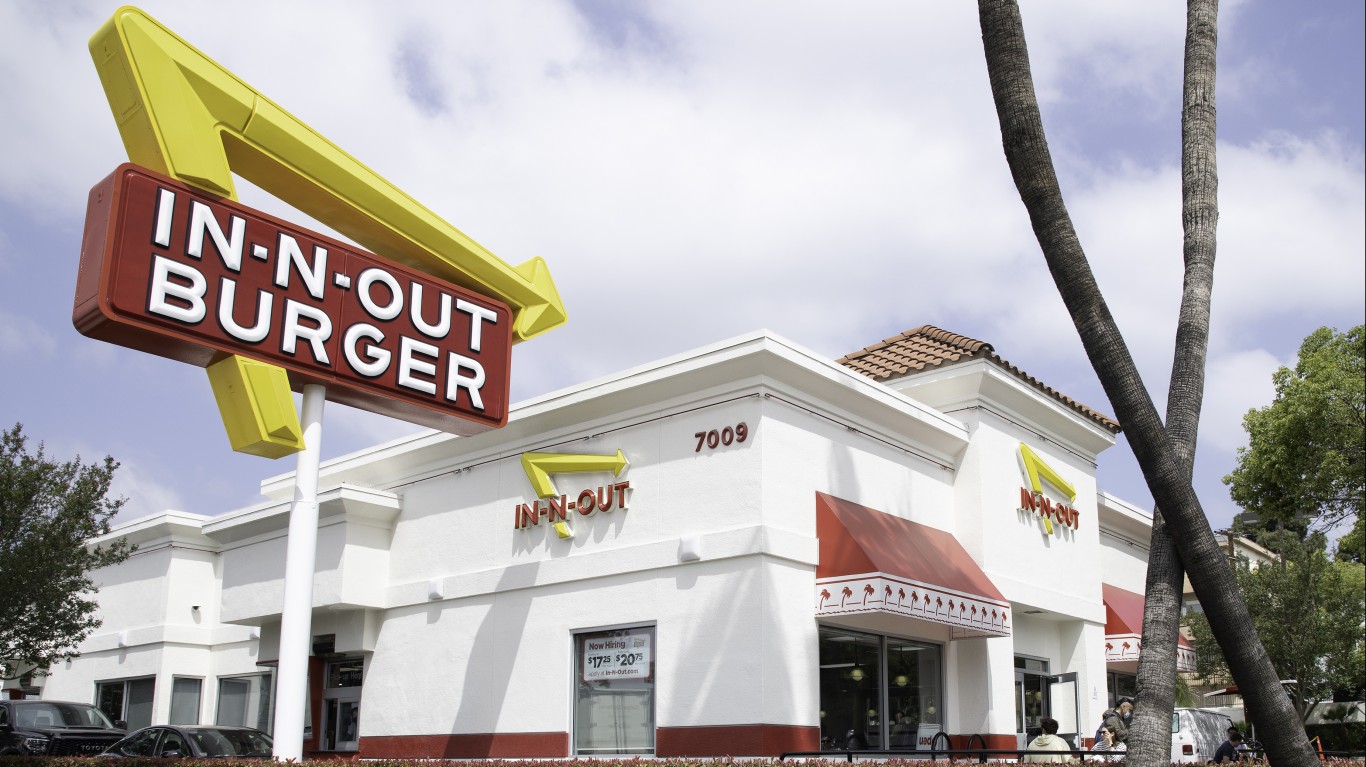
Drinking habits, like just about everything else, vary from place to place, and some cocktails and other types of beverages are more closely identified with certain states than others.
People have probably been known to order a Hurricane, that definitive New Orleans rum drink, in Montana, but nobody would ever associate it with Big Sky Country. The Mint Julep would be a refreshing enough tipple on the California coast, but for most people, it probably evokes Kentucky, and specifically the Kentucky Derby. (Wherever they are, the health-conscious might want to consider the alcoholic cocktails with the fewest calories.)
The legislatures in some 29 states have designated at least one official state beverage, drink, spirit, or soft drink (and occasionally several). Surprisingly, 20 of those states, presumably all major dairy producers, have chosen milk. One has gone with water. Others specify a particular brand of whiskey or a brand of soft drink. One has nominated locally grown tea.
Reviewing state websites, alcoholic beverage industry publications, and various pop culture sources, 24/7 Tempo has assembled a list of signature drinks from all 50 states. These are only occasionally the officially designated beverages — milk appears only once — but include cocktails invented in or indelibly linked to various states as well as individual kinds of alcohol or soda known to be consumed in large quantities in one state or another. (Food preferences vary widely, too. This is the most iconic food every state has given the rest of the U.S.)
Lift a glass to the colorful variety of American drinking habits.
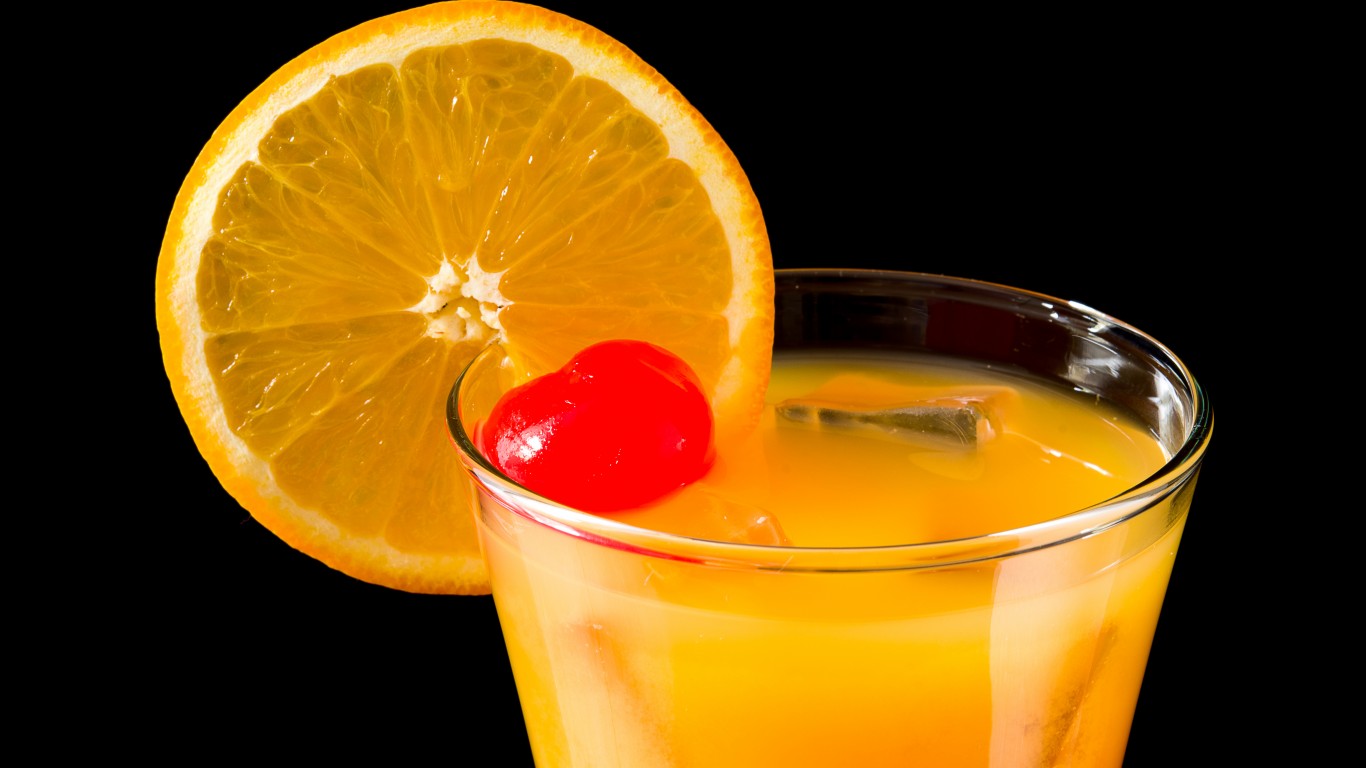
Alabama: Yellowhammer
Alabama has been known as the Yellowhammer State since local Confederate soldiers affixed pieces of yellow cloth to their uniforms to stand out, causing others to equate them with the yellowhammer, a yellow-coated woodpecker that’s now the state bird. The cocktail of the same name (also called the Alabama Slammer) — made with rum, vodka, amaretto, and orange and pineapple juices — is the unofficial tipple of University of Alabama football fans.
[in-text-ad]
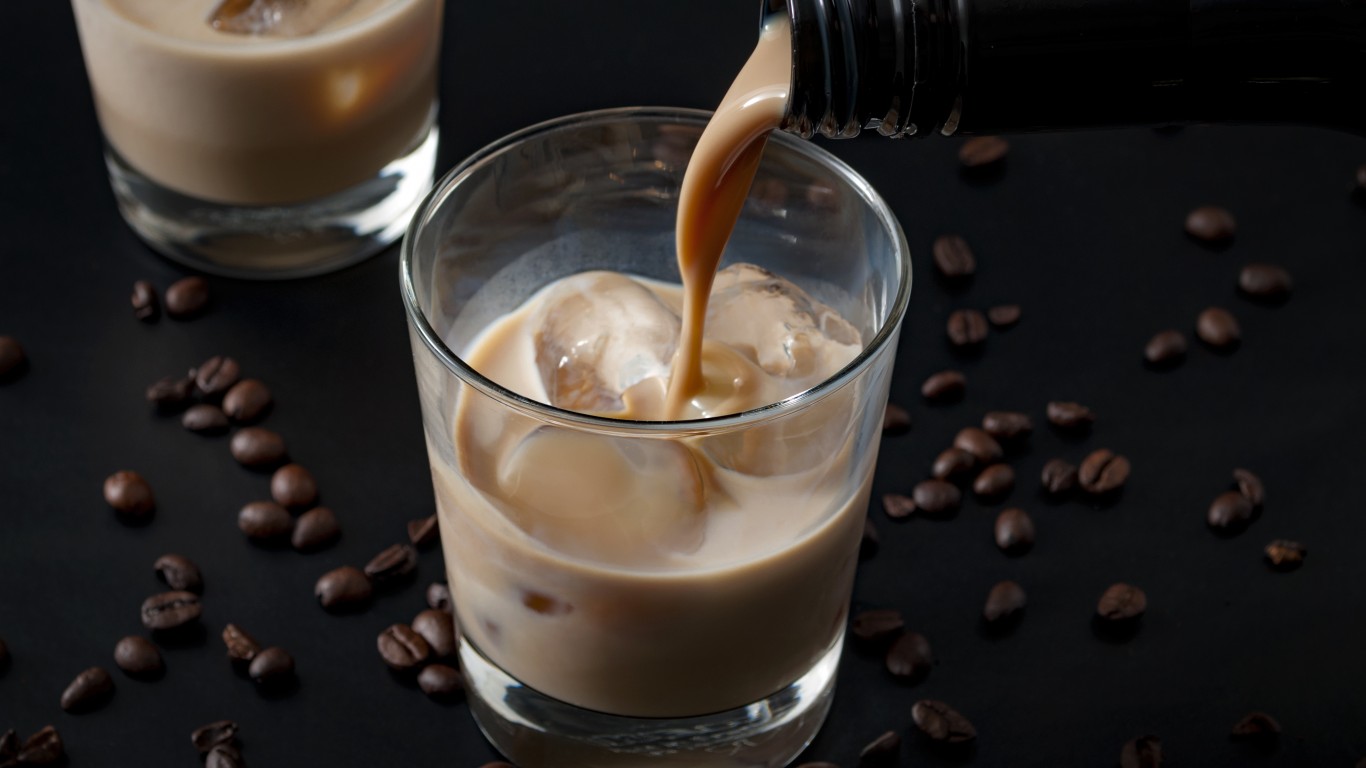
Alaska: Duck Fart Shot
Kahlúa (or some other coffee liqueur), Bailey’s Irish Cream or something similar, and blended or Canadian whiskey, layered in that order in a tall shot glass, the Duck Fart Shot is said to have been created at the Peanut Farm, a sports bar and grill in Anchorage. (The name is supposedly a reference to a woman who grew flatulent after drinking a lot of them.) It’s been called the Alaskan equivalent of the Mai Tai in Hawaii.
Arizona: Tequila Sunrise
The familiar drink of tequila, orange juice, and grenadine was created at The Trident in Sausalito, California, in the early 1970s, and became the inspiration for a hit song by The Eagles and a 1988 movie. An earlier cocktail of that name was born at the Arizona Biltmore in Phoenix in 1940 and is still served there, but the California version is more popular around the state. It even lends its name to an annual early morning drinkfest in the bars of Flagstaff to celebrate Northern Arizona University’s homecoming.

Arkansas: Arkansas Razorback
Fans of the University of Arkansas’s Razorbacks love this blend of rum, vodka, amaretto, and Kahlúa or other coffee liqueur, but it’s enjoyed all over Arkansas. Its origins are unknown, but a thread on a U of A history discussion group site suggested that it might have been invented at Maxine’s Taproom in Fayetteville, and that it might not date back further than 2008.
[in-text-ad-2]
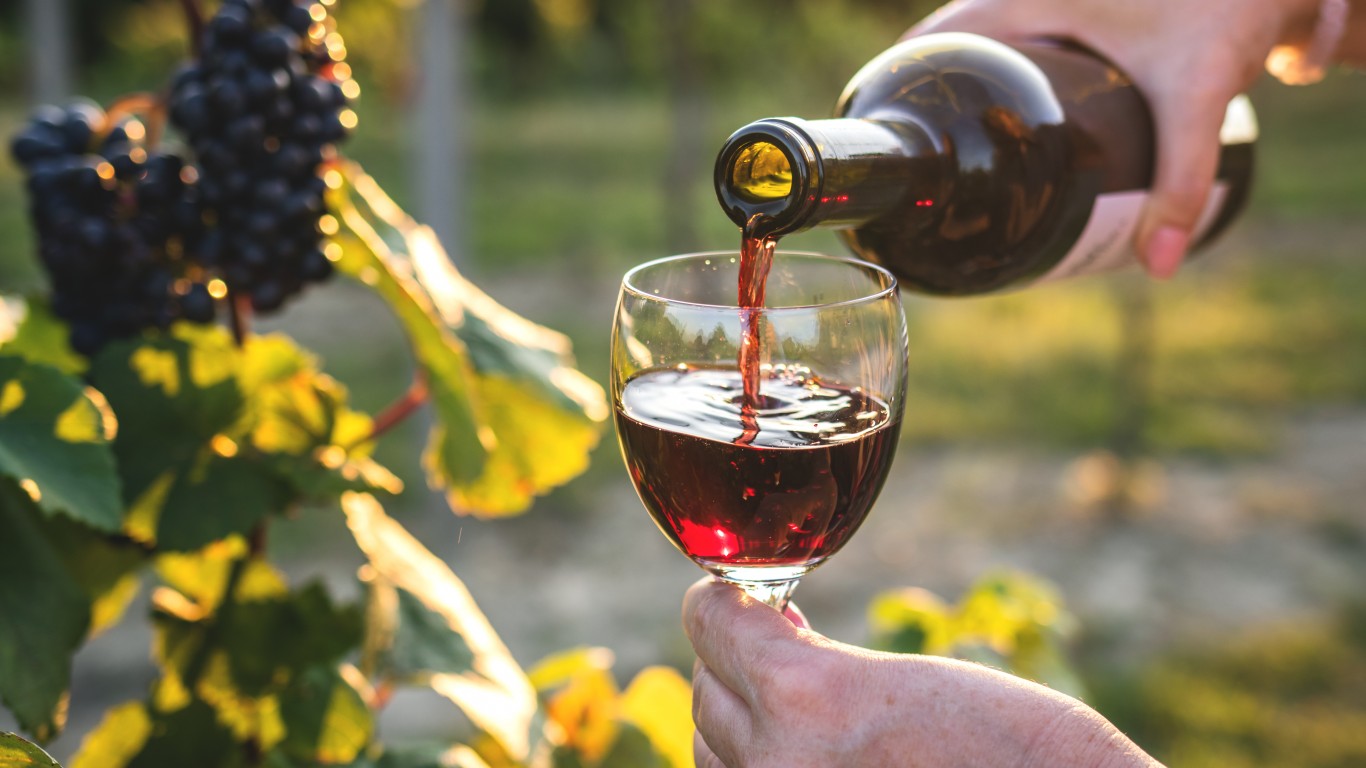
California: Cabernet sauvignon
Wine is made in all 50 states (yes, including Alaska and Hawaii), but California produces almost 85% of American vino and — though there are certainly exceptions — is known for making most of the best examples. While it would be hard to think of a wine grape that isn’t grown in the state, cabernet sauvignon is both its internationally acclaimed flagship and its most widely planted variety (slightly edging out chardonnay).
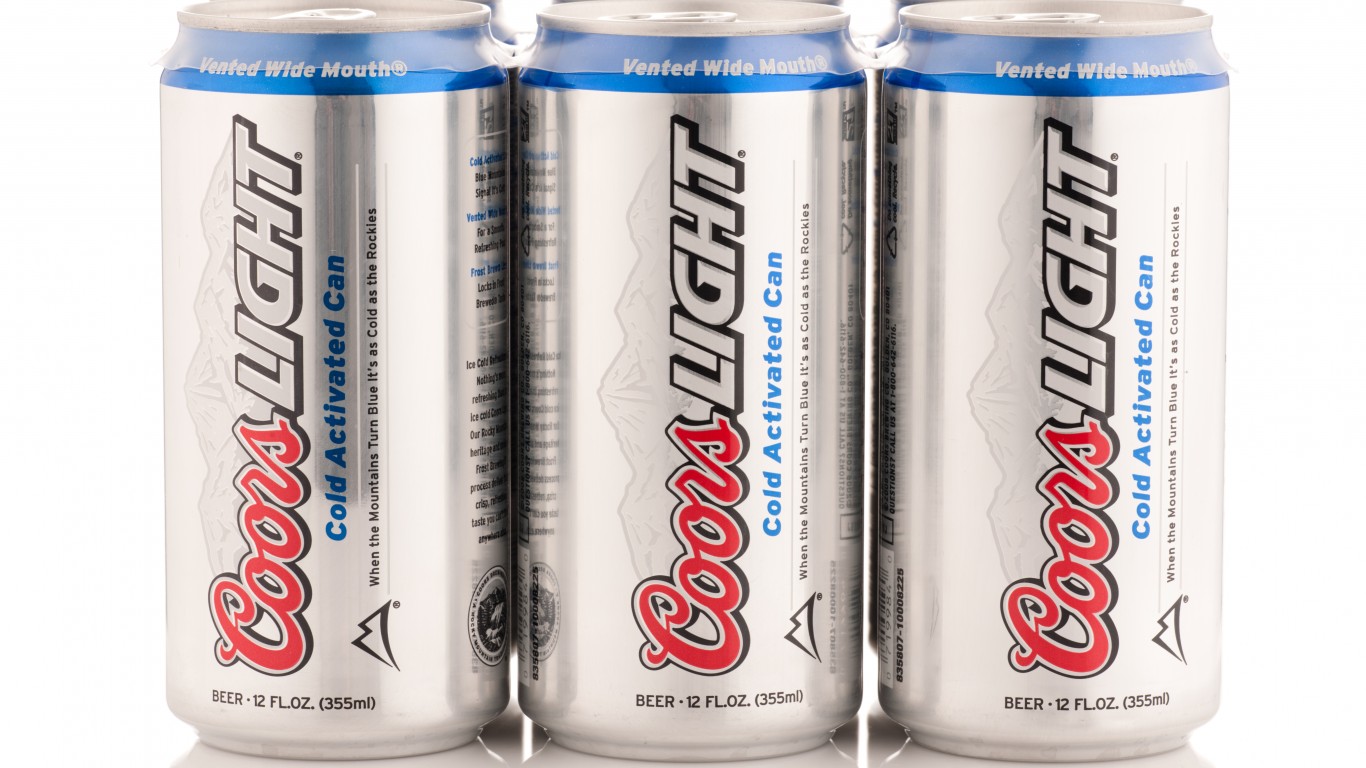
Colorado: Coors beer
Serious beer-lovers in the state tend to scorn it in favor of craft offerings from local craft breweries, but with the Rocky Mountain iconography on its packaging, its century-and-a-half of history, and its cult status (for many years it was available only in 11 Western states and people used to “smuggle” it east; see the 1977 Burt Reynolds movie “Smokey and the Bandit”), no beer is more strongly identified with Colorado.
[in-text-ad]
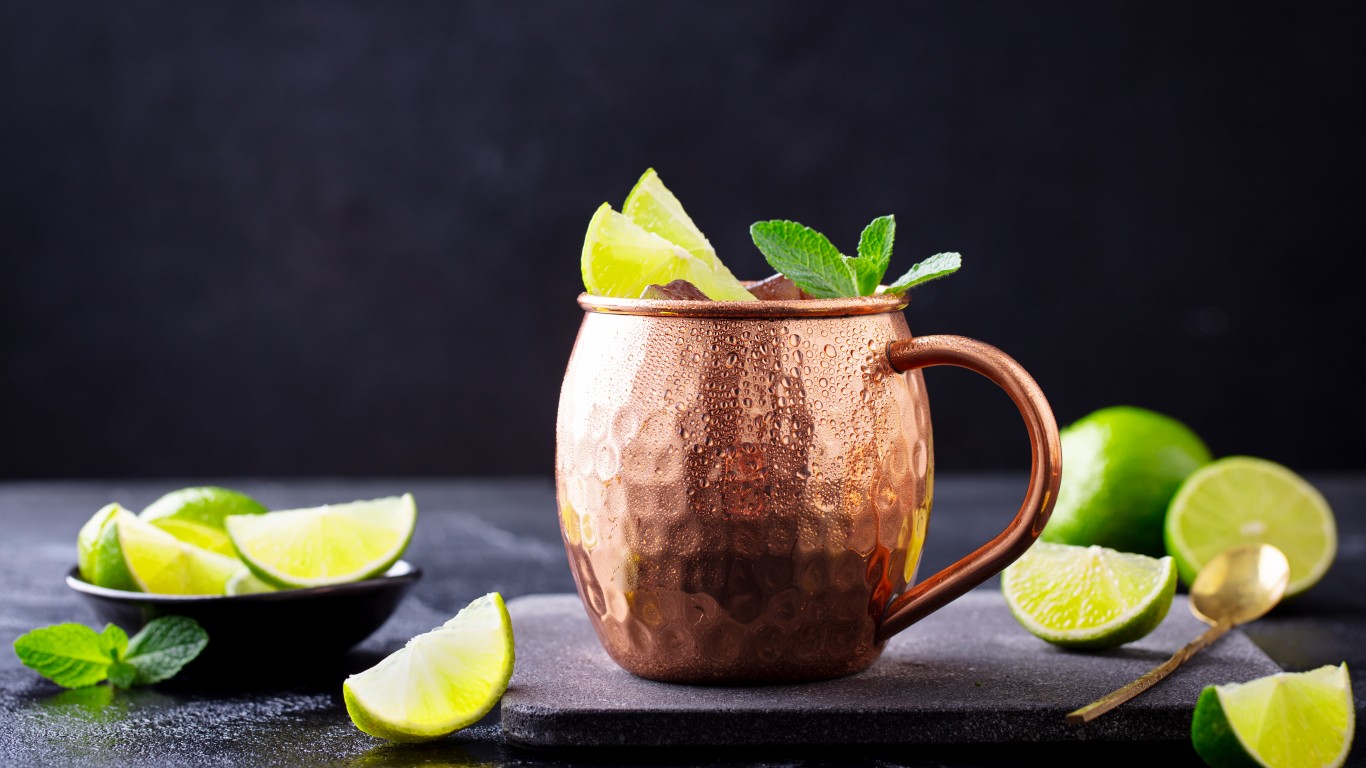
Connecticut: Moscow Mule
This frosty concoction of vodka, ginger beer, and lime juice, traditionally served in a copper mug, is said to have been invented at a New York City hotel — by an employee of G.F. Heublein Brothers, a major food and liquor producer and distributor based in Hartford, Connecticut’s capital. Another connection: The cocktail was originally made with Smirnoff vodka, produced by a Russian emigré in the Connecticut town of Bethel (Heublein later bought his company).
Delaware: Dogfish Head IPA
Though this popular craft brewery, one of the highest-rated in America, borrows its name from Dogfish Head, Maine, and is now owned by the Massachusetts-based Boston Beer Company, its beers — especially its numerous IPAs — are indelibly identified with Delaware. Its new Blue Hen Pilsner is even made with barley grown on the Delmarva Peninsula, most of which is within the state.
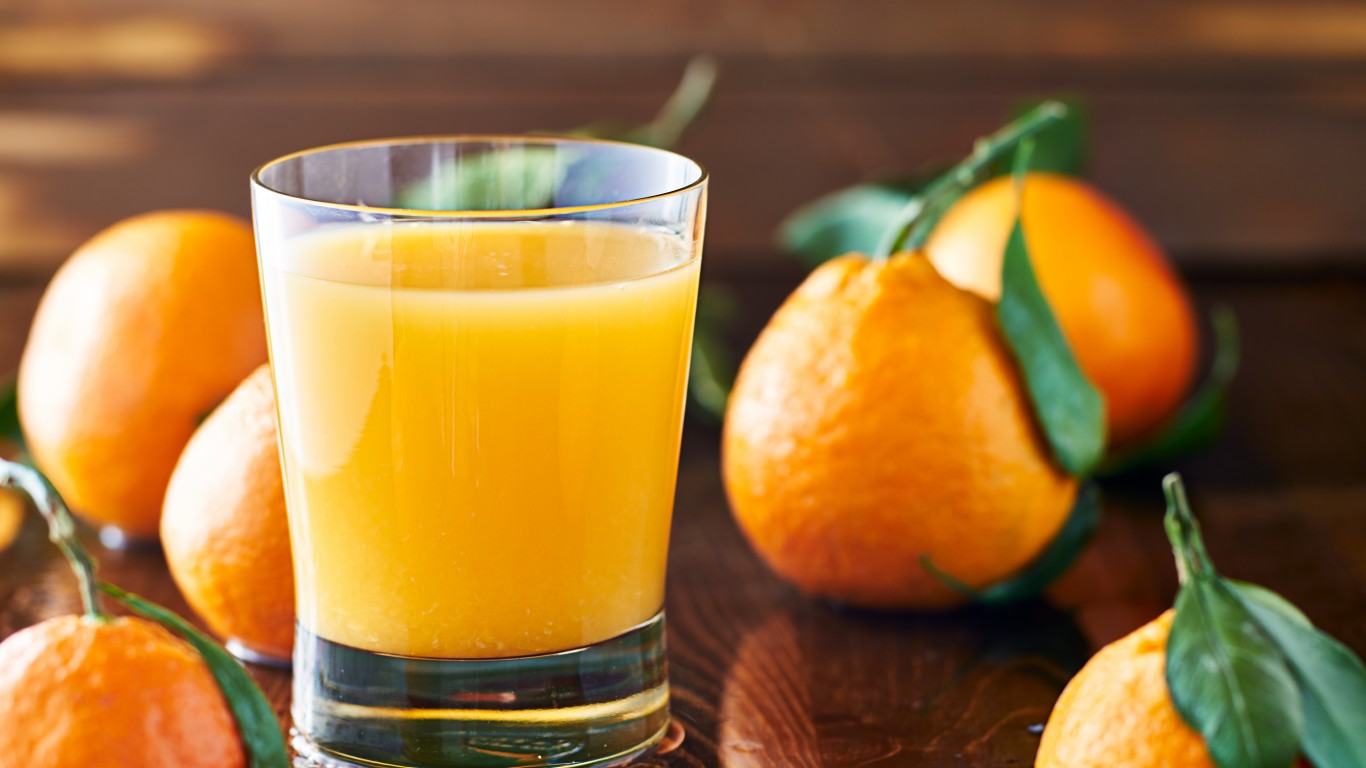
Florida: Orange juice
Florida is best known as the Sunshine State, but it’s the Orange State, too — producing about 70% of all the oranges grown in America. Whether on the breakfast table or mixed with vodka for a Screwdriver (or sparkling wine for a Mimosa) or in any other form, it’s the definitive Florida beverage — and was officially designated as such in 1967.
[in-text-ad-2]
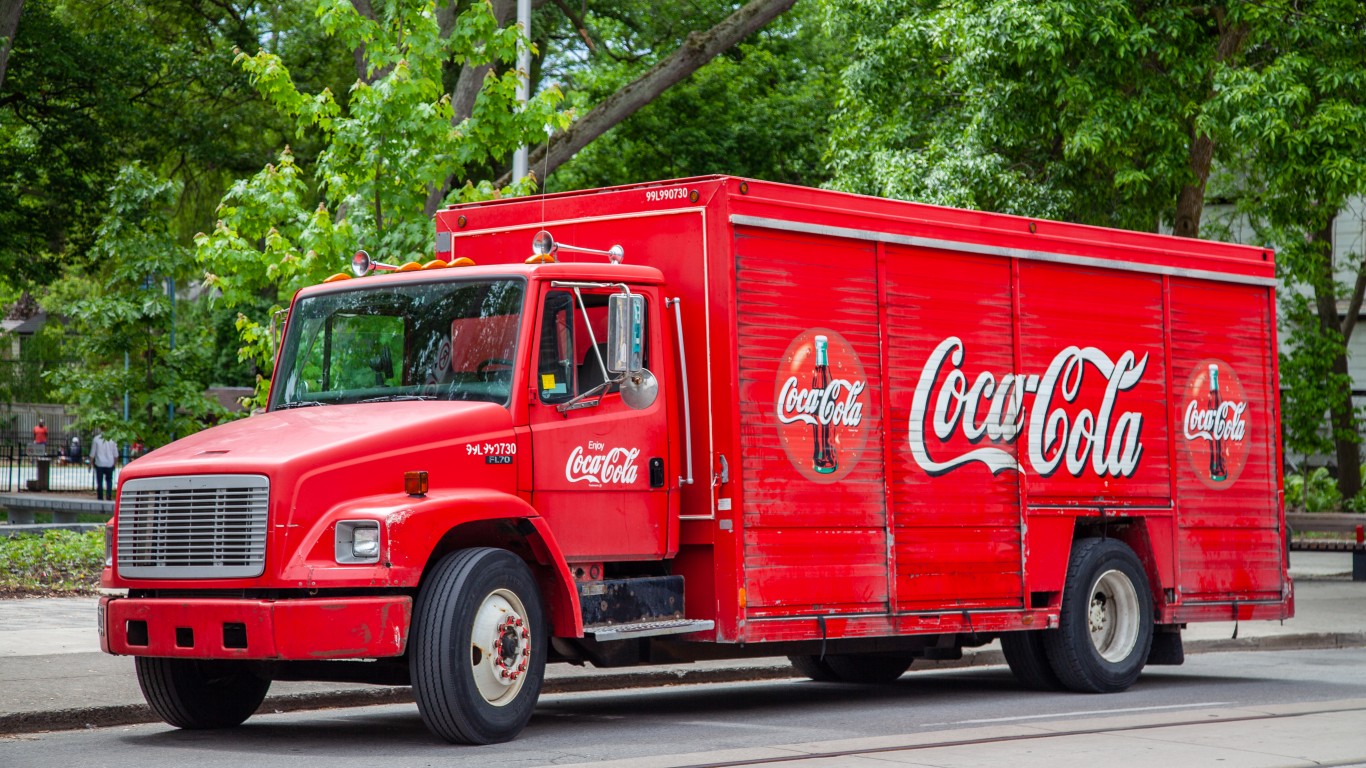
Georgia: Coca-Cola
By far the world’s most popular soft drink, Coke traces its origins to a patent medicine invented in Columbus, Georgia, in the 1860s by a former Confederate army officer named John Pemberton. It went through numerous permutations before Asa Griggs Candler, an Atlanta businessman, bought the formula and started the Coca-Cola Company in 1892. No other beverage is so identified with the state today.
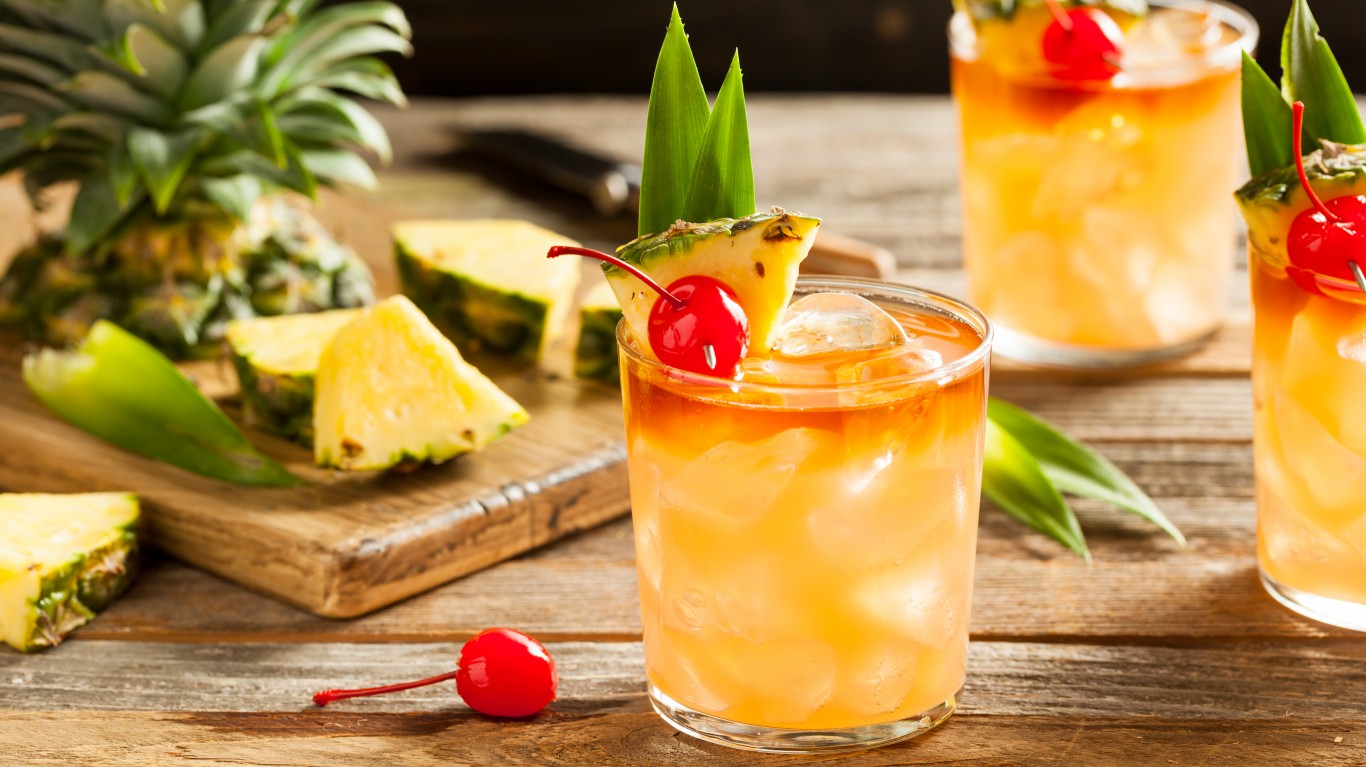
Hawaii: Mai Tai
Though it was invented by a California restaurateur — either Donn Beach in Hollywood in 1933 or “Trader Vic” Bergeron in Oakland in 1944 — this rum-based cocktail has become the ultimate alcoholic expression of Polynesian-inspired Tiki culture. It may be served around the country, but it has become so identified with tropical R&R that it’s difficult to imagine a bar or restaurant in Hawaii that doesn’t mix up countless examples of it daily.
[in-text-ad]
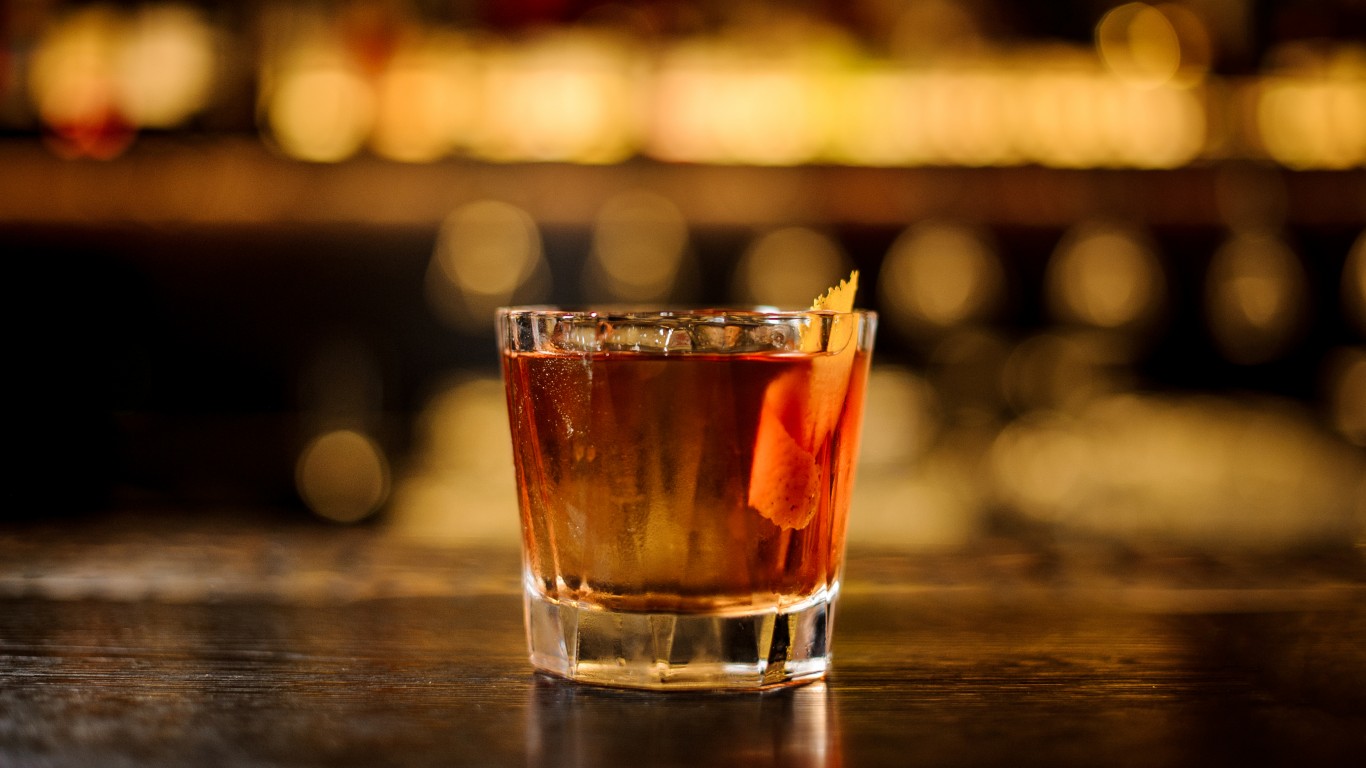
Idaho: Whiskey sour
The product comparison site Versus Reviews used Google search frequency to determine the most popular cocktail in every state, and Idaho’s was this 19th-century creation, combining whiskey with lemon juice and sugar. The state is certainly known for its love of whiskey. It’s best-selling liquor brand by volume is the Canadian whiskey (actually “whisky”) Black Velvet.
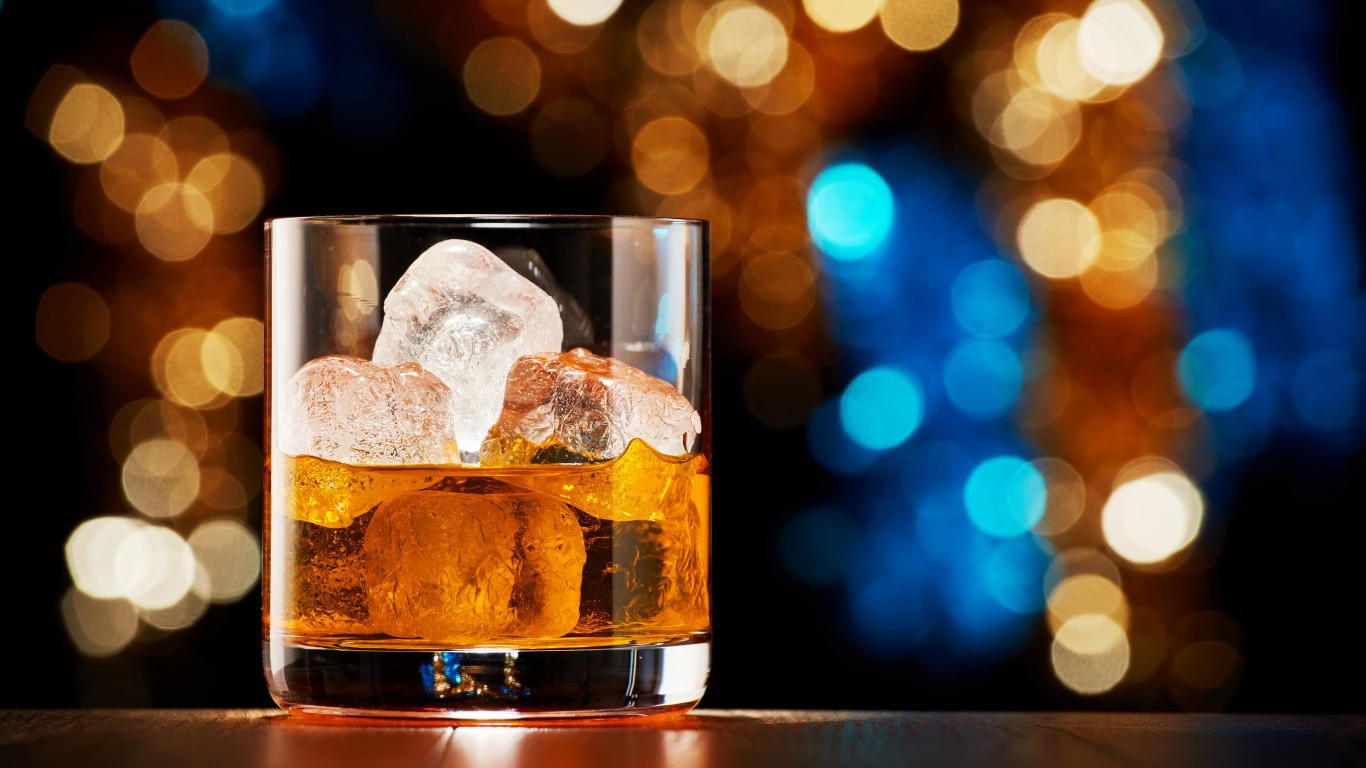
Illinois: Irish whiskey
Irish whiskey is in the ascendance in the U.S. According to the Distilled Spirits Council, sales grew 6.9% in 2020 to a total of $1.13 billion. Whiskey in general is the most-ordered liquor in Chicago, and the city has a substantial Irish-American population (they dye the Chicago River green on St. Patrick’s Day). It’s not surprising, then, that the premier Irish brand, Jameson, is one of Chicago’s two most popular examples of the spirit (the other being Jack Daniel’s).
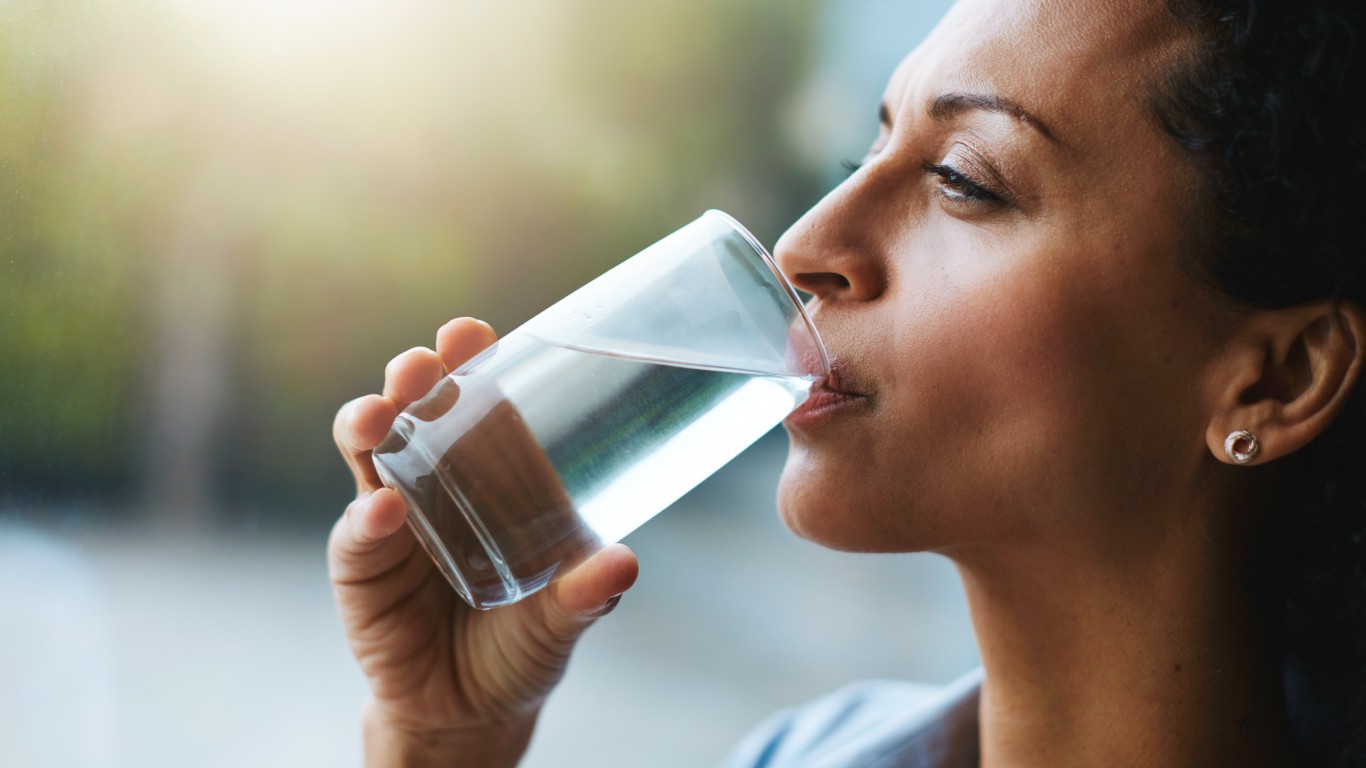
Indiana: Water
There’s no argument here: In 2007, the Indiana State Senate declared that the official state beverage was, yes, H2O. Water, read State Resolution 20, “is important to retain the environmental integrity and economic and aesthetic values of Indiana lakes, streams, wetlands, and ground water” and “plays a critical role in in securing a healthy and vibrant Indiana society” — among other reasons to hail it.
[in-text-ad-2]
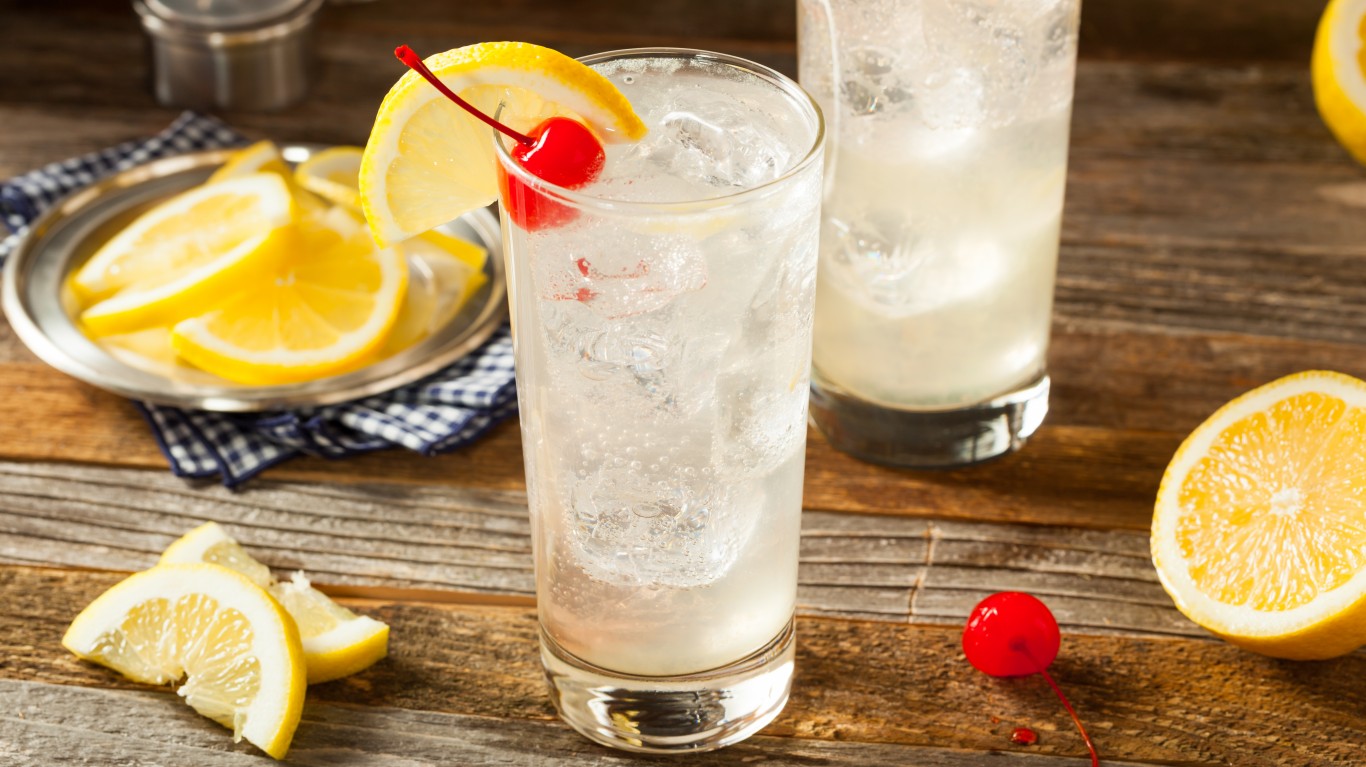
Iowa: Tom Collins
Though it has no particular connection with the Hawkeye State — it is probably English in origin, though it has been known in the U.S. since the 1890s — numerous surveys (including a review of Google searches) have shown this highball to be Iowa’s most popular cocktail, especially in the summer months. It’s basically sparkling spiked lemonade — gin, lemon juice, simple syrup, and soda.
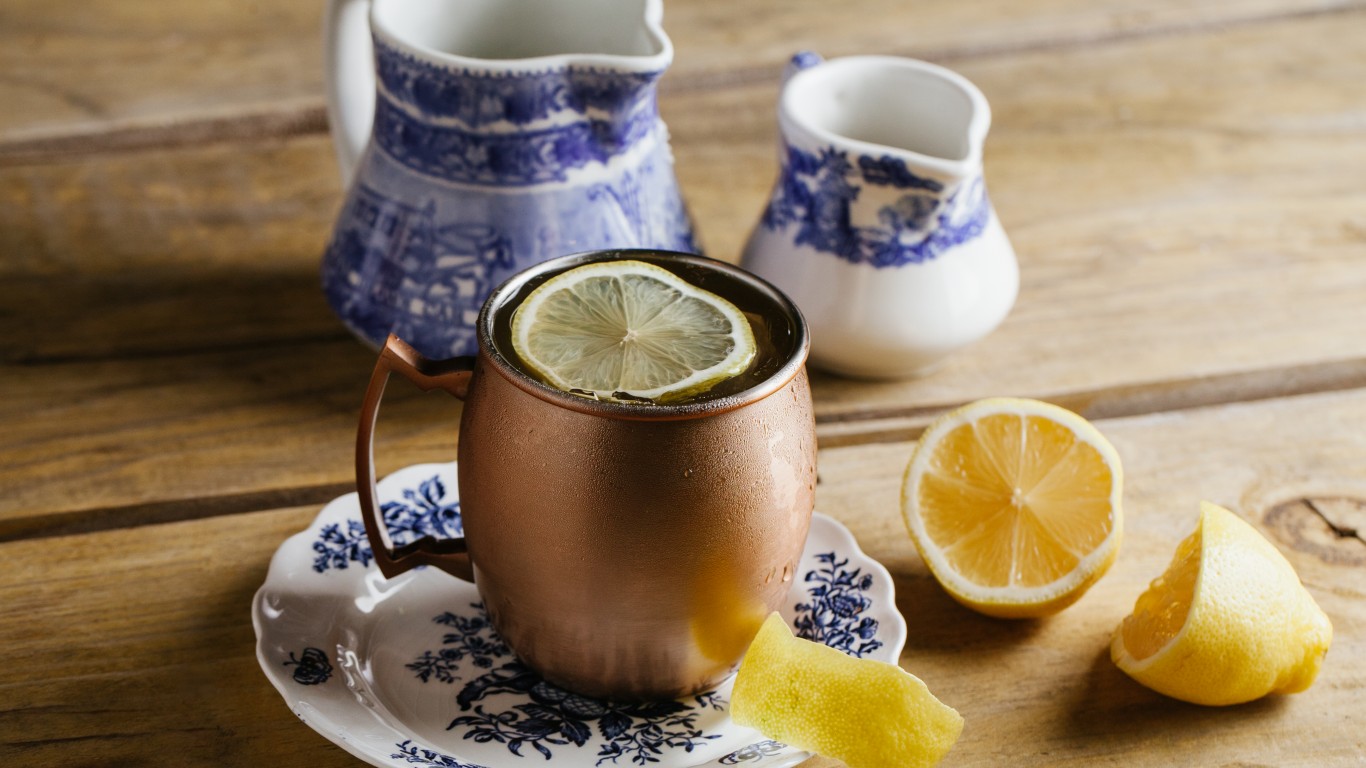
Kansas: Horsefeather
This variation on the Moscow Mule, made with rye or blended whiskey, ginger beer, Angostura bitters, and lemon juice, was invented in the Kansas college town of Lawrence in the 1990s. It remains a standard in bars in Lawrence and in both Kansas Cities (Kansas and Missouri).
[in-text-ad]
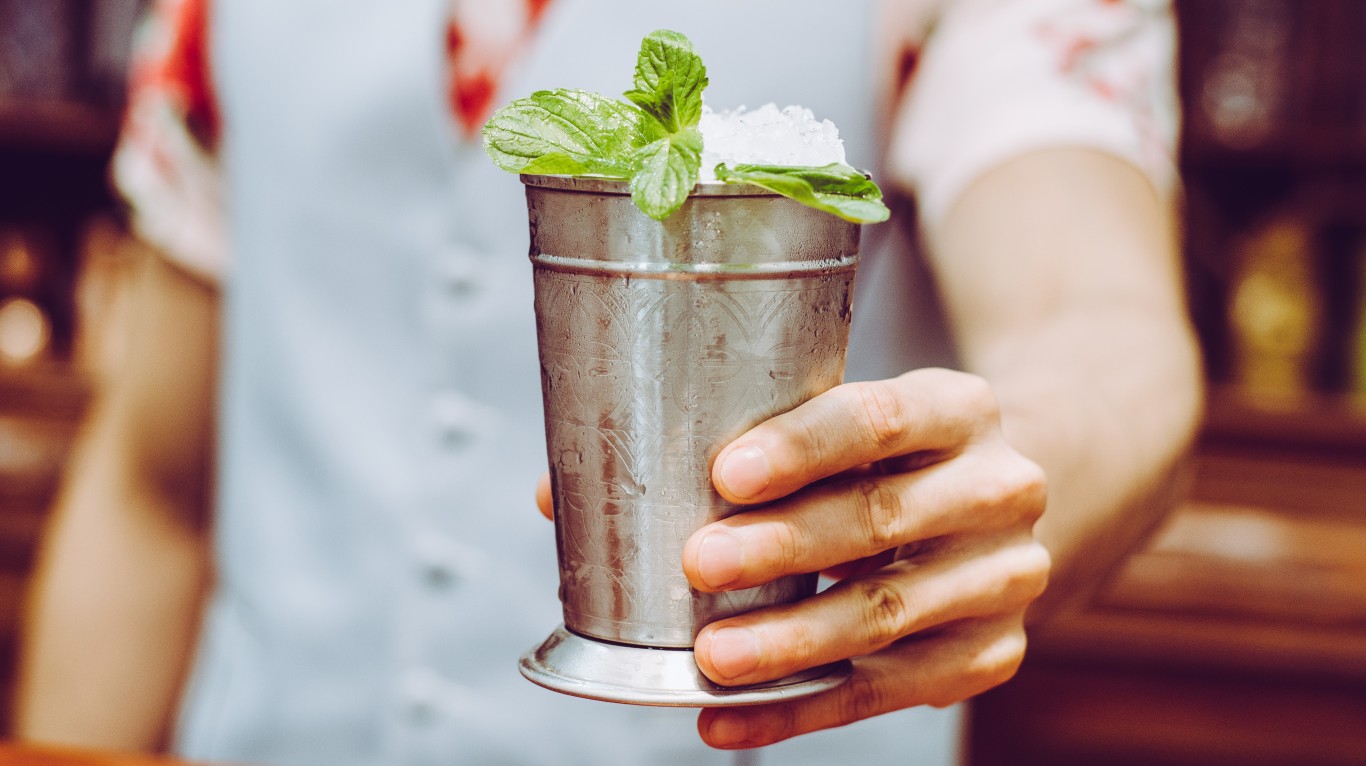
Kentucky: Mint Julep
While this classic cocktail of bourbon (Kentucky’s emblematic spirit) on ice with muddled (crushed) mint and powdered sugar probably originated in Virginia, it has been known as a specialty of the state since it was adopted as the Kentucky Derby’s signature cocktail in 1938. It is said that almost 120,000 juleps are served at Churchill Downs every year.
Louisiana: Hurricane
New Orleans has given birth to countless cocktails over the years, including the Sazerac, the Vieux Carré, the Ramos Gin Fizz, and the Café Brûlot. Perhaps no creation typifies the city’s drinking culture as much as the Hurricane, however, said to have been invented by one Pat O’Brien at his French Quarter bar in the 1940s. To use up excess rum he’d had to buy to get the whiskey he wanted, he mixed two or three varieties of it with passion fruit syrup and lemon juice and served it in glasses shaped like hurricane lamps. Today, the drink is often guzzled from plastic cups on the street (where drinking is legal) by French Quarter merry-makers.

Maine: Moxie
One of the most famous of all regional soft drinks, Moxie is an herbal soda, flavored with bitterish gentian root, invented in the 1870s in Lowell, Massachusetts. Despite being from out-of-state, it was declared Maine’s official soft drink in 2005. (Since 2018, it has been owned by the Coca-Cola Company.)
[in-text-ad-2]

Maryland: Orange Crush (cocktail)
This Orange Crush isn’t the 110-year-old soft drink of that name and has nothing to do with the 1988 R.E.M. song (which was actually about Agent Orange). It’s a cocktail invented at the Harborside Bar & Grill in West Ocean City in the late 1990s and now popular around the state. The vitamin-C-heavy tipple combines orange vodka, triple sec (an orange liqueur), orange juice, and a little Sierra Mist (a lemon-lime soft drink).

Massachusetts: Cranberry juice
Massachusetts grows about 2 million 100-pound barrels of cranberries every year, and the Ocean Spray cooperative, headquartered in Lakeville-Middleborough, Mass. — which has growers not only in its home state but also in five other states plus parts of Canada — invented the cranberry juice cocktail. No wonder the Massachusetts state legislature declared cranberry juice the state drink in 1970.
[in-text-ad]
Michigan: Vernors ginger ale
Ginger ale aficionados often name this rich, barrel-aged soft drink as their favorite. First formulated by a Detroit pharmacist in 1866, it was once promoted as “Detroit’s drink.” The city’s own Aretha Franklin was famous for her holiday ham glazed with Vernors.
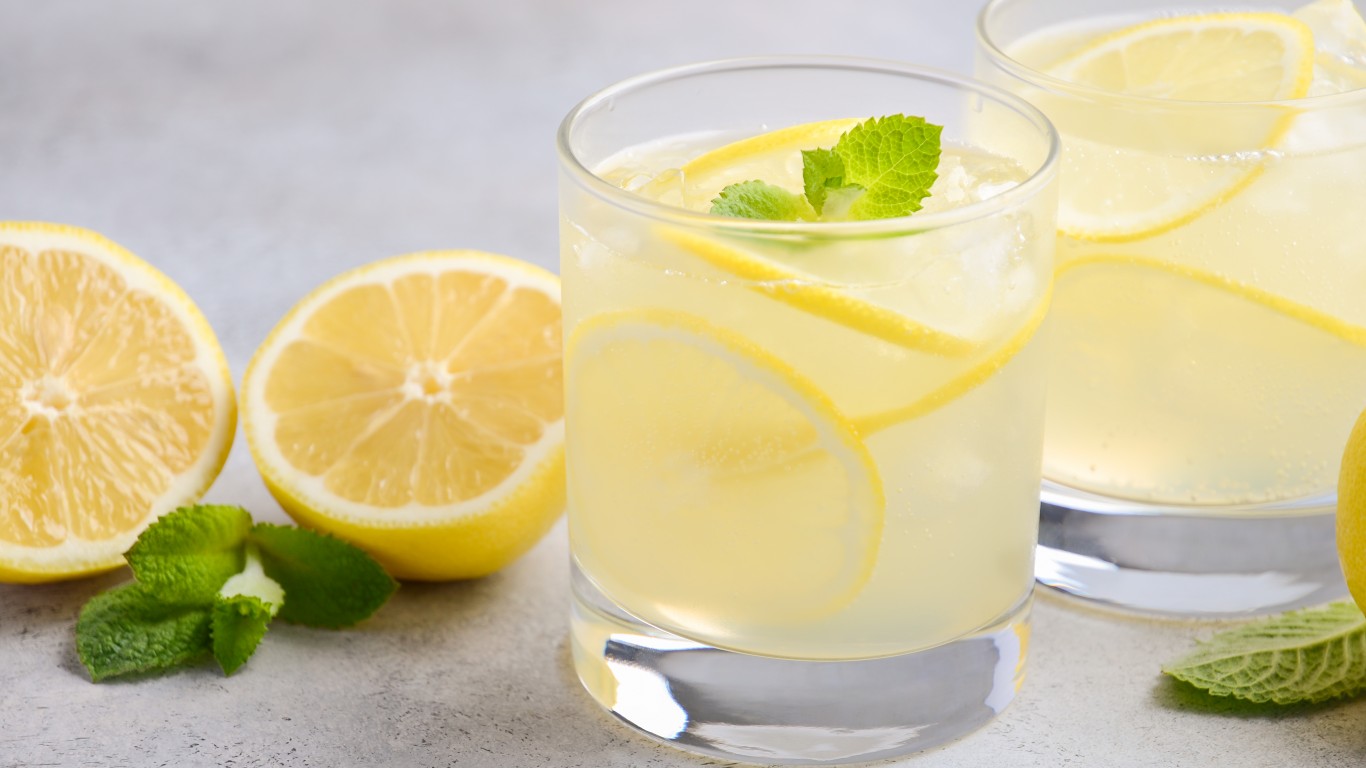
Minnesota: Bootleg
The Bootleg (or Bootlegger) is considered Minnesota’s unofficial state cocktail. Nobody knows exactly where or when it was invented, but it probably dates from the Prohibition Era, and has long been a staple at local country clubs (the state is famous as a golfer’s paradise). It can be made with gin, rum, or vodka, combined with frozen limeade and lemonade, simple syrup, and chopped mint, with a float of club soda.

Mississippi: Milk Punch
Though this relative of egg nog is often associated with New Orleans, it is popular throughout the Deep South, and is said to have been a favored quaff on the river steamers that ran between New Orleans and the Mississippi towns of Natchez or Vicksburg. Every bartender in the state probably has his or her own version, but the classic involves simply bourbon (sometimes brandy), cold milk, sugar, vanilla extract, and a dusting of nutmeg. Perhaps not coincidentally, Mississippi is one of the places that has named milk its state beverage.
[in-text-ad-2]

Missouri: Fitz’s Root Beer
This definitive Missouri soft drink isn’t even 30 years old in its modern form, but it traces its history back to 1947. Fitz’s was a burger joint in the St. Louis suburb of Richmond Heights that started producing a house root beer after World War II. The place closed in 1976, and production of the beverage stopped. In 1993, a couple of investors decided to revive the drink, setting up a vintage 1940s-era bottling line in another suburb, University City. The original recipe is still used.

Montana: Boilermaker
Beer and whiskey — a meeting of the grains. The traditional boilermaker is a shot of the latter, quickly downed, followed by a beer chaser. Some people prefer to mix the booze into the brew — or drop the shot glass into the beer glass (in which case it’s sometimes called a Depth Charge). The connection with Montana? Drink historians trace its origins to Butte in the 1890s, when it was a favorite of miners after work, initially under the name “Sean O’Farrell.”
[in-text-ad]

Nebraska: Red beer
Kool-Aid is the official state soft drink here, but perhaps it’s better not to get into that. What many Cornhuskers ask for when they belly up to the bar at their local tavern and what lubricates every autumn tailgate is red beer — in effect a Heartland version of Mexico’s popular Michelada. It’s tomato or V8 juice spiced with Worcestershire and hot sauce, mixed with icy cold beer.
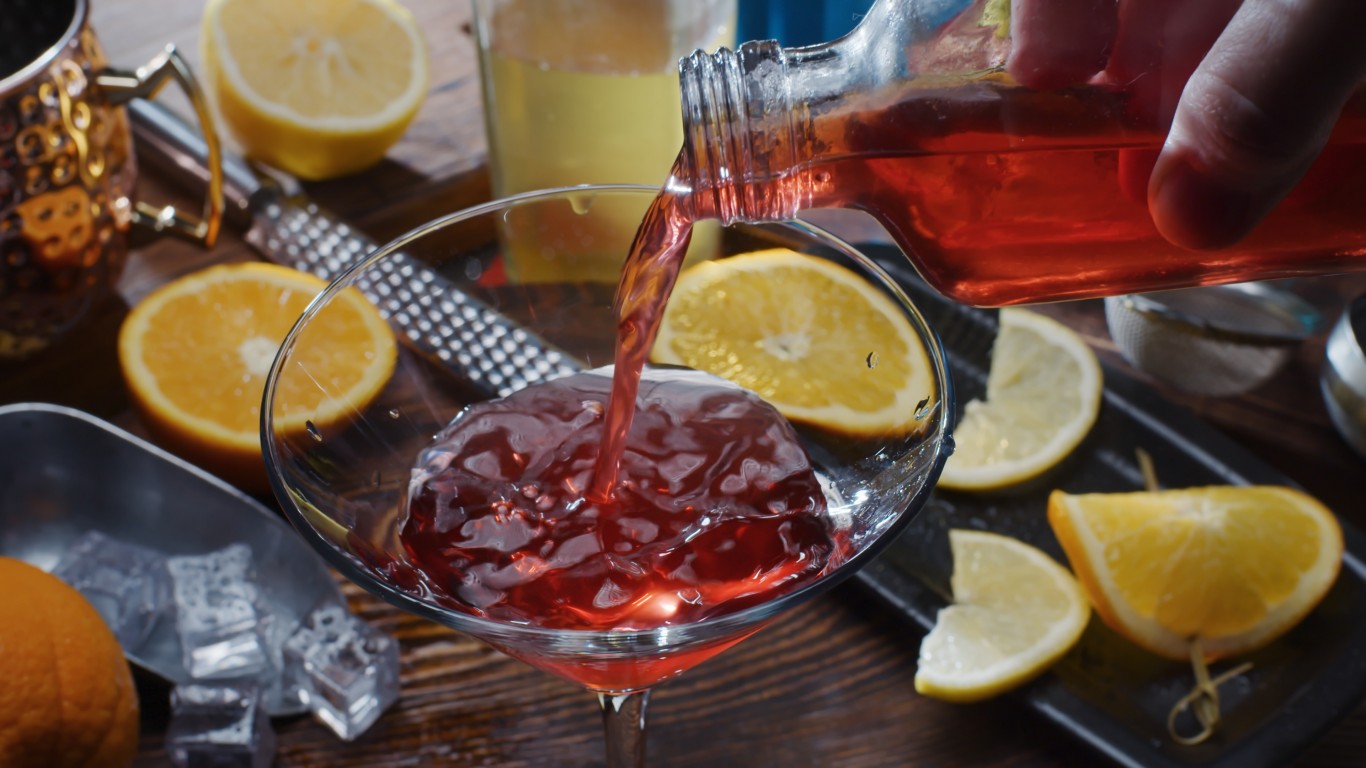
Nevada: Picon Punch
Picon is a French bitter apéritif, and this highball cocktail involves a healthy dose of it or some other bitter liqueur with club soda, grenadine syrup, lemon juice, and a float of brandy. It was invented by Basque immigrants to Idaho or Nevada in the 19th century, and remains popular in Nevada’s northern portion to this day.

New Hampshire: Apple cider
Non-alcoholic apple cider was named New Hampshire’s state beverage in 2010, as a result of an elementary school project in which students at Jaffrey Grade School were assigned to draft a bill to learn the legislative process. Most likely to the school’s surprise, legislators took the idea seriously. While it’s not the largest apple-producing state, New Hampshire does have more than 1,400 acres of apple trees — and onetime Granite State governor David Goodell invented the apple peeler.
[in-text-ad-2]
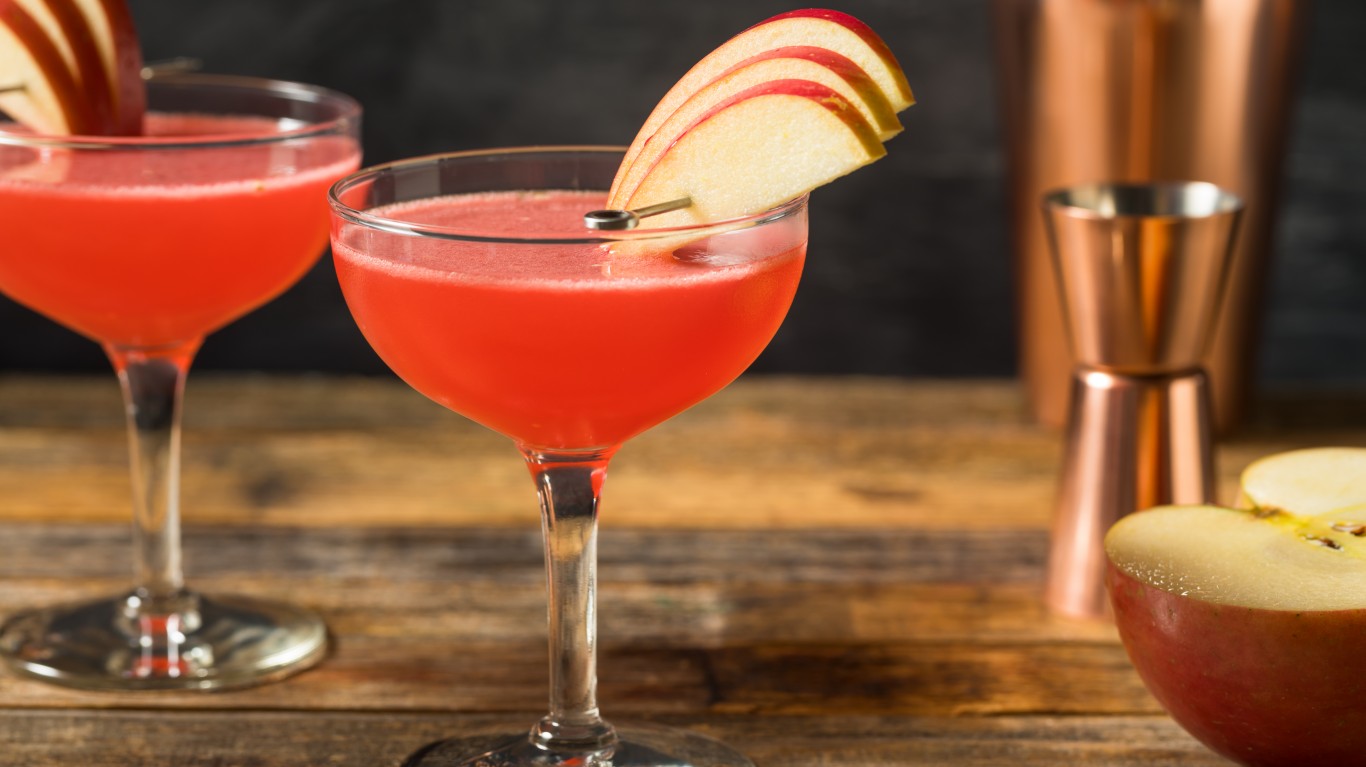
New Jersey: Jack Rose
Nobody’s quite sure who this cocktail of apple brandy (or applejack), grenadine syrup, and lemon juice is named for, but it is widely agreed that it was invented in New Jersey, possibly in Newark, in the early 20th century. It was well enough known that Ernest Hemingway had the narrator of “The Sun Also Rises” drinks one at a hotel bar in Paris, but it eventually fell out of fashion. Since the early 21st century, though, it has experienced a revival in New Jersey and elsewhere.
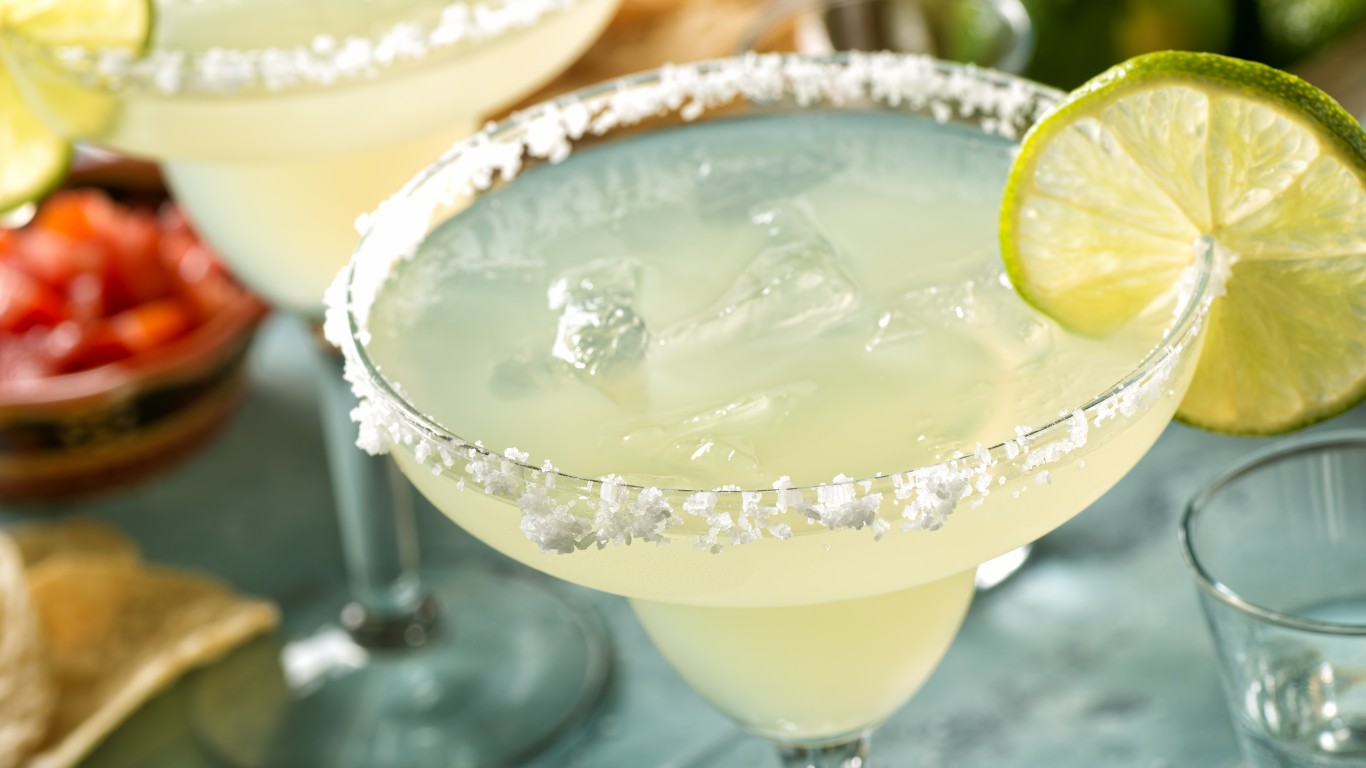
New Mexico: Margarita
There are countless stories about the origins of this extremely popular drink of tequila, orange liqueur, and lime juice, dating it from the 1930s or ’40s and ascribing its invention to Baja California, Acapulco, Juárez, and the Texas cities of Houston and Galveston. While New Mexico makes no claim to having invented the drink, it is said to be the state’s most popular cocktail — and Santa Fe has even created a Margarita Trail, allowing the ambitious drinker to sample the some 45 examples of what Tourism Santa Fe calls “the best margaritas in the world.”
[in-text-ad]
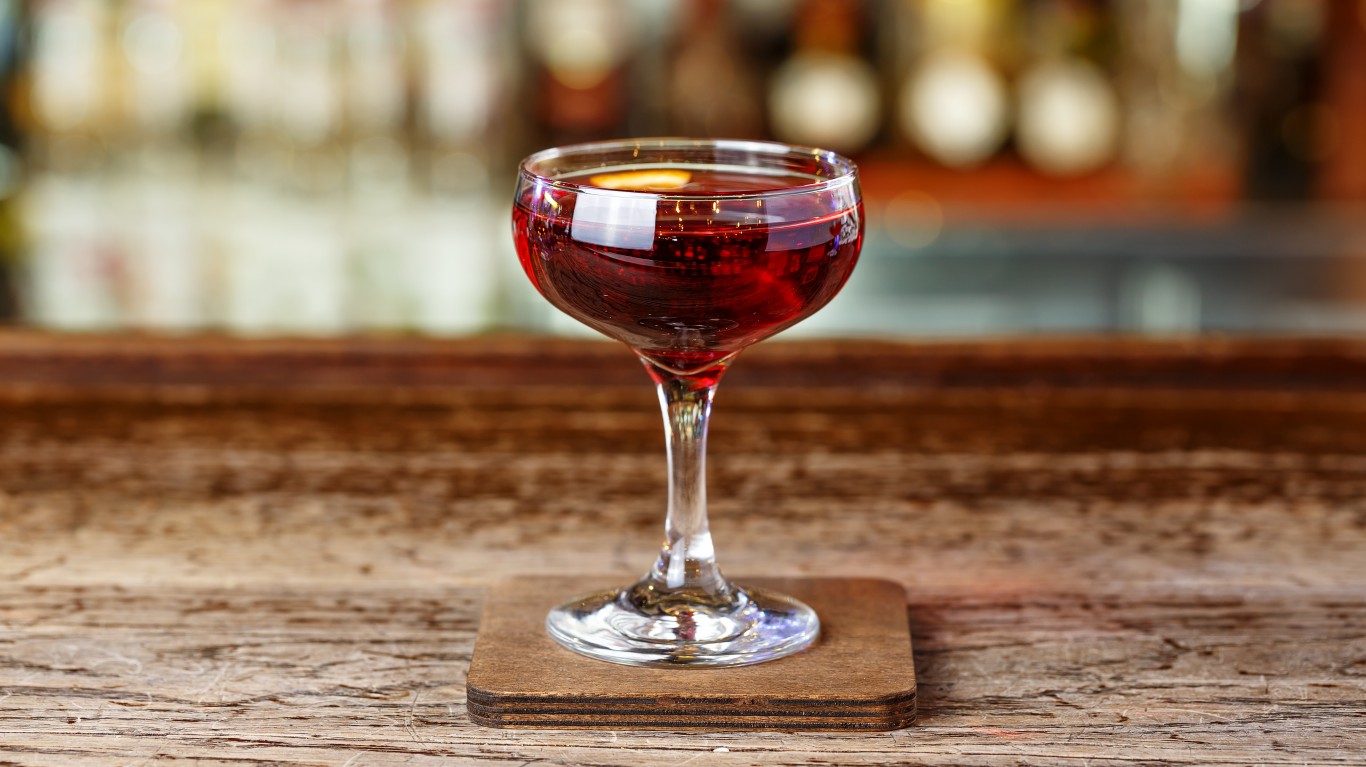
New York: The Manhattan
Considered one of the great classic cocktails, this blend of rye whiskey, sweet vermouth, and Angostura bitters (according to the traditional recipe, anyway) dates from the mid-19th century, when it was first mixed up at a bar or private club somewhere on the island for which it is named. (There is also a Brooklyn Cocktail and a Bronx Cocktail — the latter invented, curiously, in Philadelphia.)
North Carolina: Cheerwine
Actual grape wine, some of it quite good, is made in North Carolina today, but the state’s most popular “wine” isn’t wine at all but this 104-year-old black-cherry-flavored soft drink from the town of Salisbury. The producer also makes Cheerwine ice cream. In 2010, Krispy Kreme even introduced a Cheerwine doughnut, sold for several limited periods.
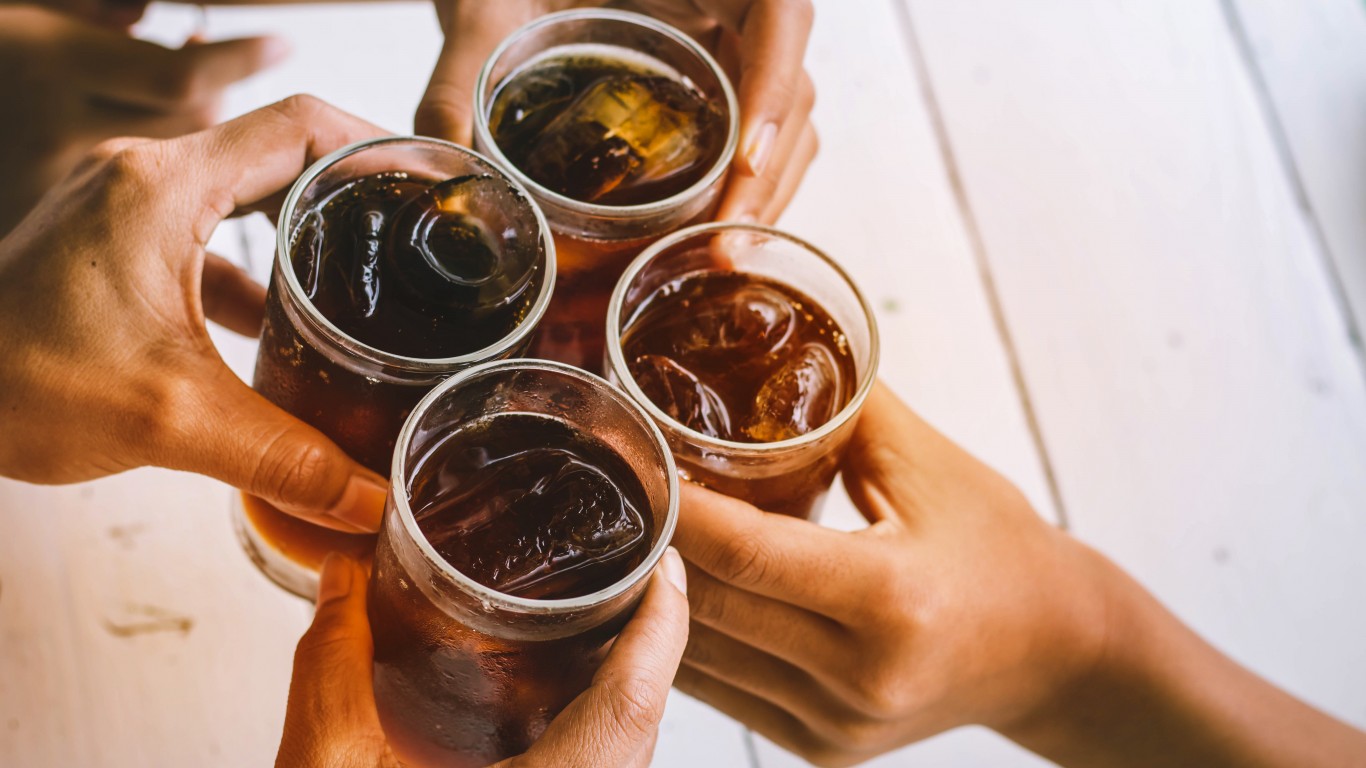
North Dakota: North Dakota Special
This north-central state is one of the country’s major whiskey consumers, with Jack Daniel’s being its favorite brand. The origins of the North Dakota Special are unknown, but it certainly speaks to the state’s whiskey cravings. The recipe calls for a shot each of Jack Daniel’s, Wild Turkey bourbon, Black Velvet Canadian whisky, and Southern Comfort, a whiskey-based orange-flavored liqueur, all diluted — but not too much — with Coke.
[in-text-ad-2]
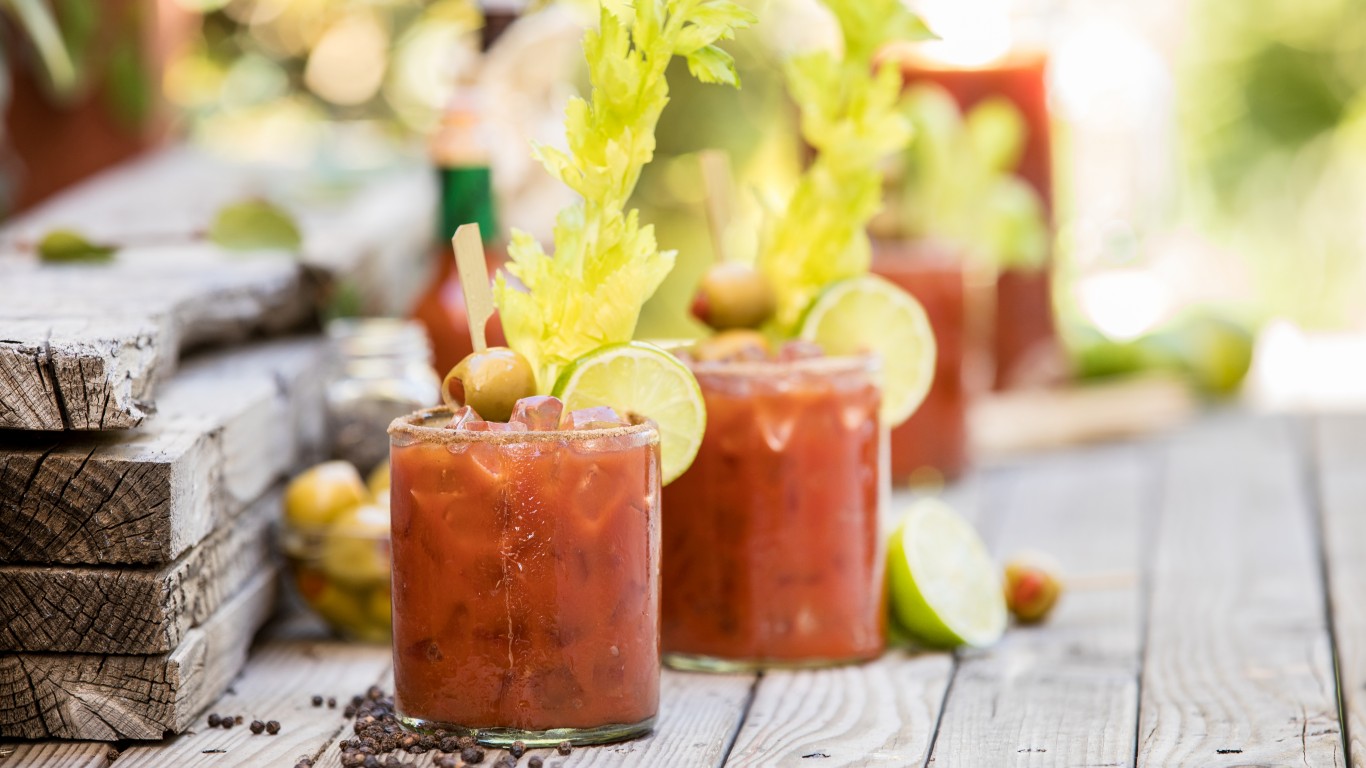
Ohio: Bloody Mary
Ohio might not be the first state you think of for tomatoes, but they’ve been grown seriously here since 1870, and there’s an annual Tomato Festival in the town of Reynoldsburg. That’s presumably what inspired the Ohio General Assembly to name tomato juice the state’s official beverage in 1965. It’s hardly surprising that Ohio bartenders have made the Bloody Mary a favorite. There’s even an annual competition, the Bloody Mary Showdown, in Dayton.
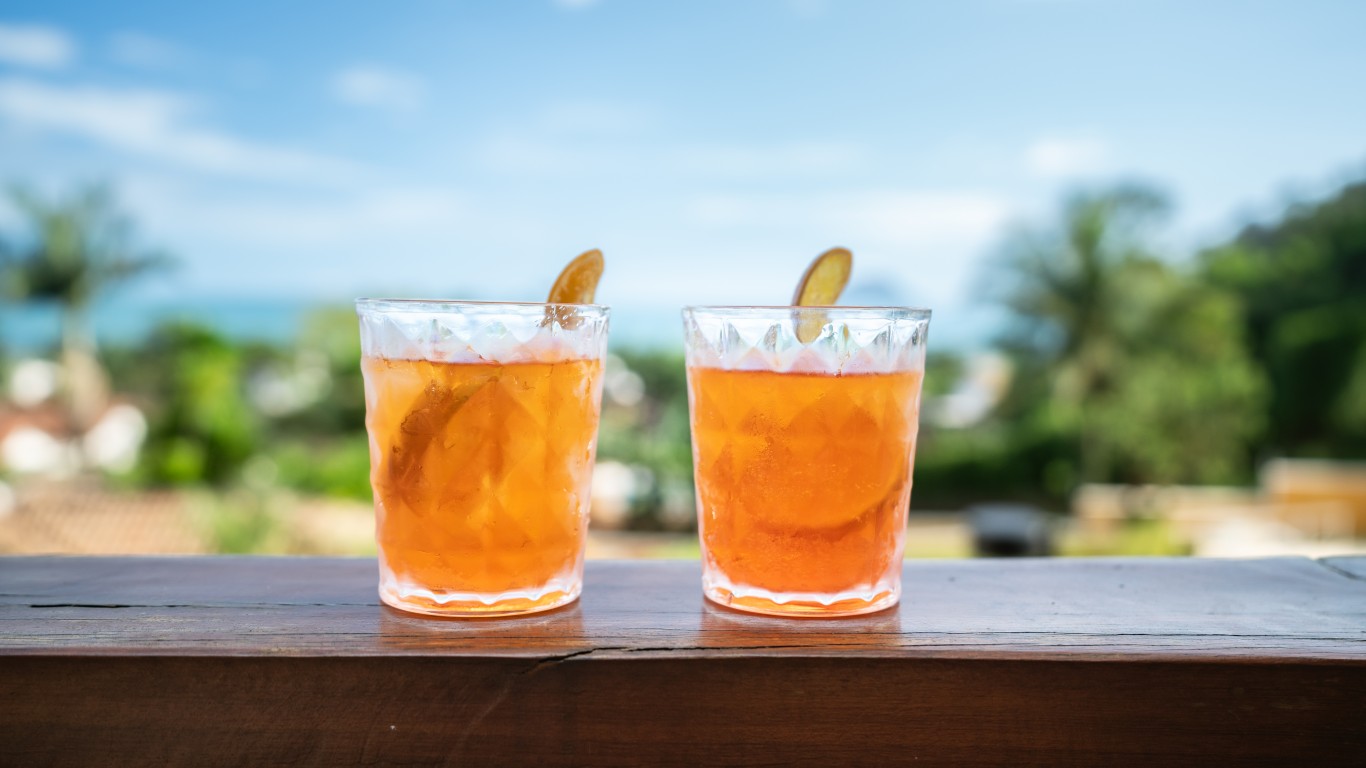
Oklahoma: Lunchbox
This uniquely Oklahoman cocktail — Coors Light, amaretto, and orange juice in a chilled mug — is an early 1990s creation originating at Edna’s Restaurant & Club in Oklahoma City. In 2017, the New York Times estimated that some 1.7 million Lunchboxes had been poured since the day it was (probably accidentally) invented.
[in-text-ad]
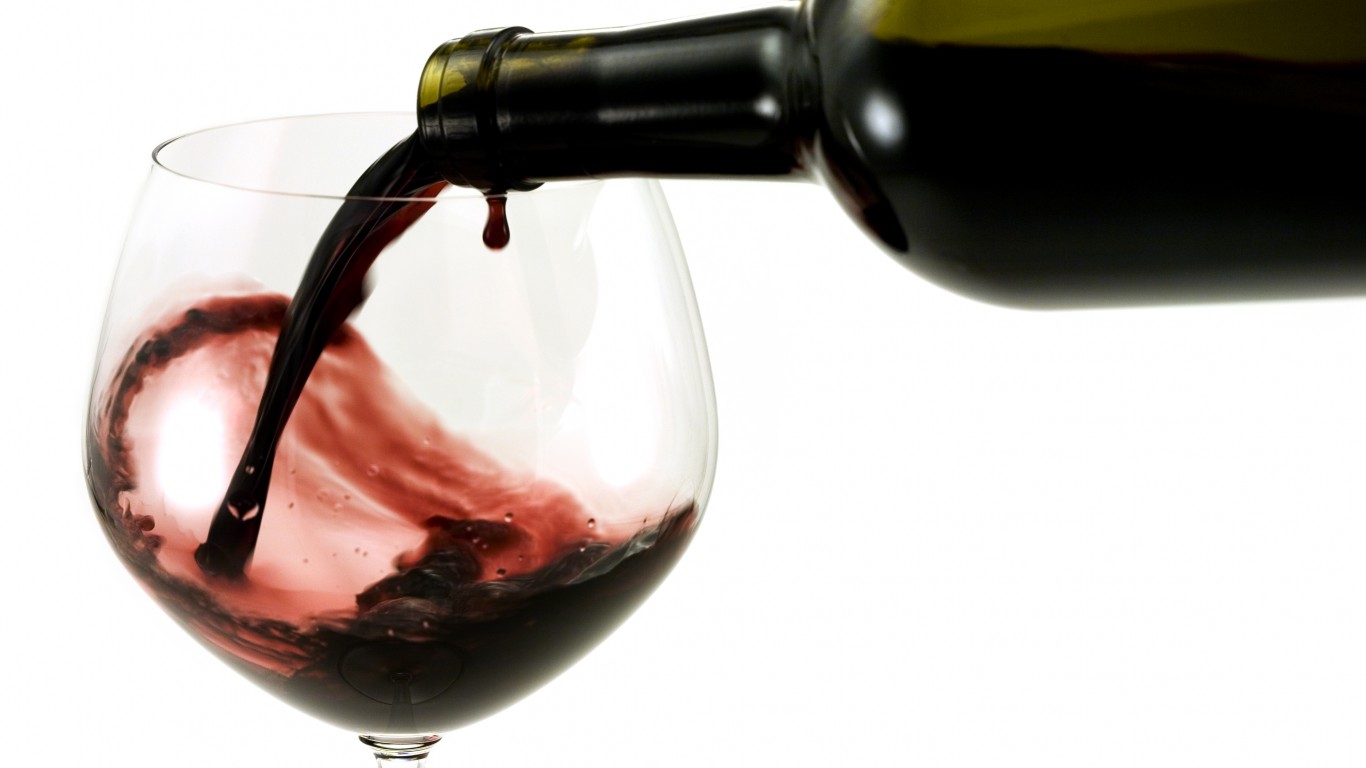
Oregon: Pinot noir
Oregon is one of the country’s major winemaking states, in quality though not in quantity, and the grape that defines its efforts most eloquently is pinot noir. Some have called its wine areas “the new Burgundy” (the rarified French wine region whose reds are made from the grape). One of the leading Burgundy producers, Robert Drouhin, has been growing grapes in the state since 1987, and there are at least six or seven other Burgundian winemakers now producing acclaimed Oregon examples of the wine.
Pennsylvania: Yuengling beer
While Pennsylvania is one of the 20 states that has named milk its official beverage (it ranks fourth in U.S. milk, butter, and ice cream production), a more potent symbol of the state is this venerable brew. Established in 1829, the enterprise officially known as D.G. Yuengling & Son is the oldest brewery in America, the country’s largest craft brewery, and the seventh-largest U.S. brewery overall.
Rhode Island: Coffee milk
The official state drink of the Ocean State is basically chocolate milk — but made with coffee syrup instead of chocolate syrup. It seems to have been developed by Italian immigrants who came to Rhode Island in the late 19th and early 20th centuries. Besides being enjoyed on its own, coffee milk has been adapted to flavor ice creams and milkshakes and even beer.
[in-text-ad-2]

South Carolina: Sweet tea
In 1995, the state government here named South Carolina-grown tea the State Hospitality Beverage. Though some people drink tea hot, in proper teacups, the most popular way to consume it — in South Carolina as well as neighboring states — is sweetened with sugar or simple syrup and poured into a tall glass over ice, with a garnish of lemon or sometimes mint.

South Dakota: Milk
South Dakota is but one of 20 states that has declared milk to be its official state beverage or drink. The Legislative Assembly named it that in recognition of the importance of the state’s dairy industry, which produces more than 300 million gallons of milk annually. That may place it only 17th in the ranking of milk-producing states, but dairies contribute substantially to the state’s economy.
[in-text-ad]
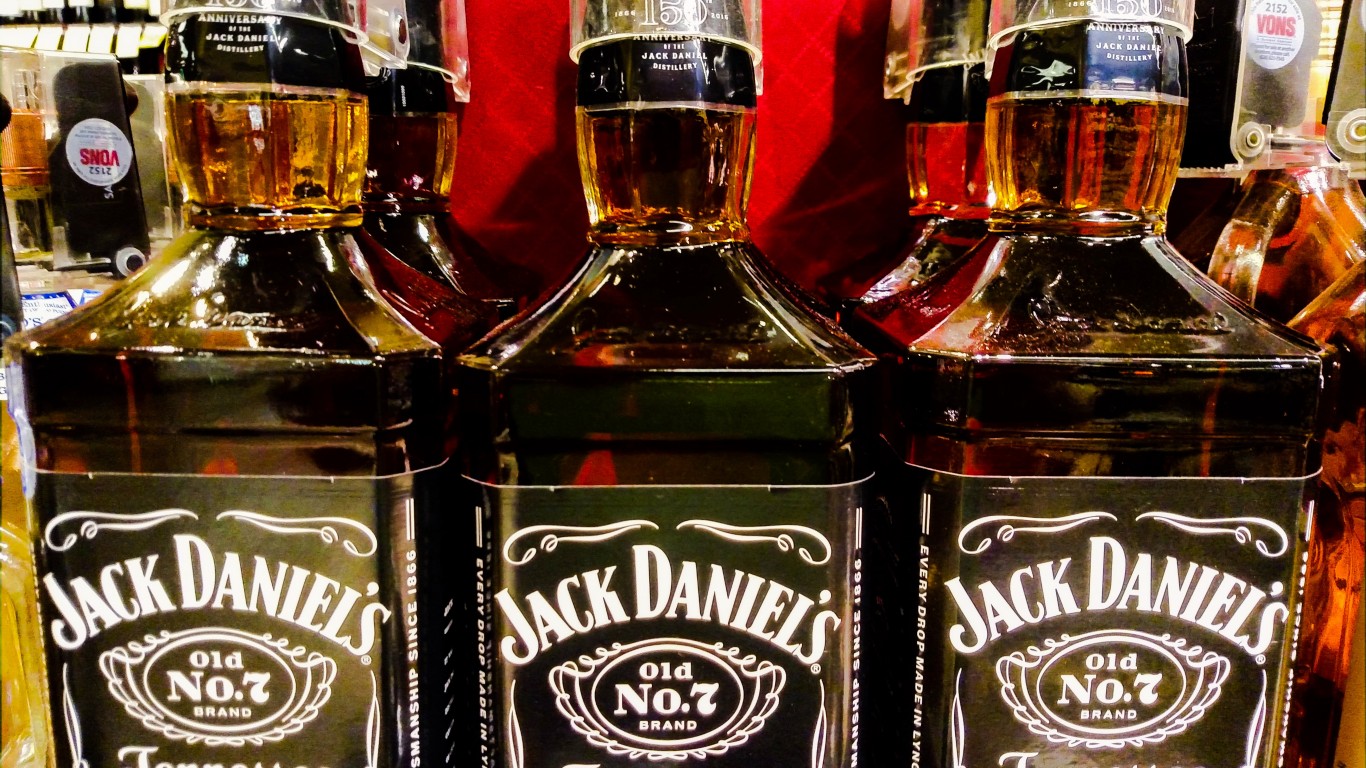
Tennessee: Jack Daniel’s
You can head for the dairy case to pick up a quart of milk, designated as Tennessee’s official state beverage in 2009, but for many Tennesseans the beverage that defines their state is this venerable whiskey. Kentucky proudly claims Bourbon as its heraldic spirit, but bourbon and rye can be made anywhere in America. Jack Daniel’s is classified as Tennessee whiskey — which can be made only in Tennessee. There are other brands — George Dickel and Heaven’s Door are other examples — but “Jack,” as it’s commonly called, is our country’s largest-selling whiskey of any kind by far, accounting for some 12.3 million 12-bottle cases in 2020.
Texas: Lone Star beer
Originating as the Alamo Brewing Company in 1884 by Adolphus Busch (better-known as the co-founder of Anheuser-Busch), this San Antonio brewery — now owned by the Pabst Brewing Company — began producing Lone Star in 1940. Along with its rival Pearl (also from a San Antonio brewery founded in the 1880s), it has long been the state’s favorite brew, and in fact proudly calls itself “The National Beer of Texas.”
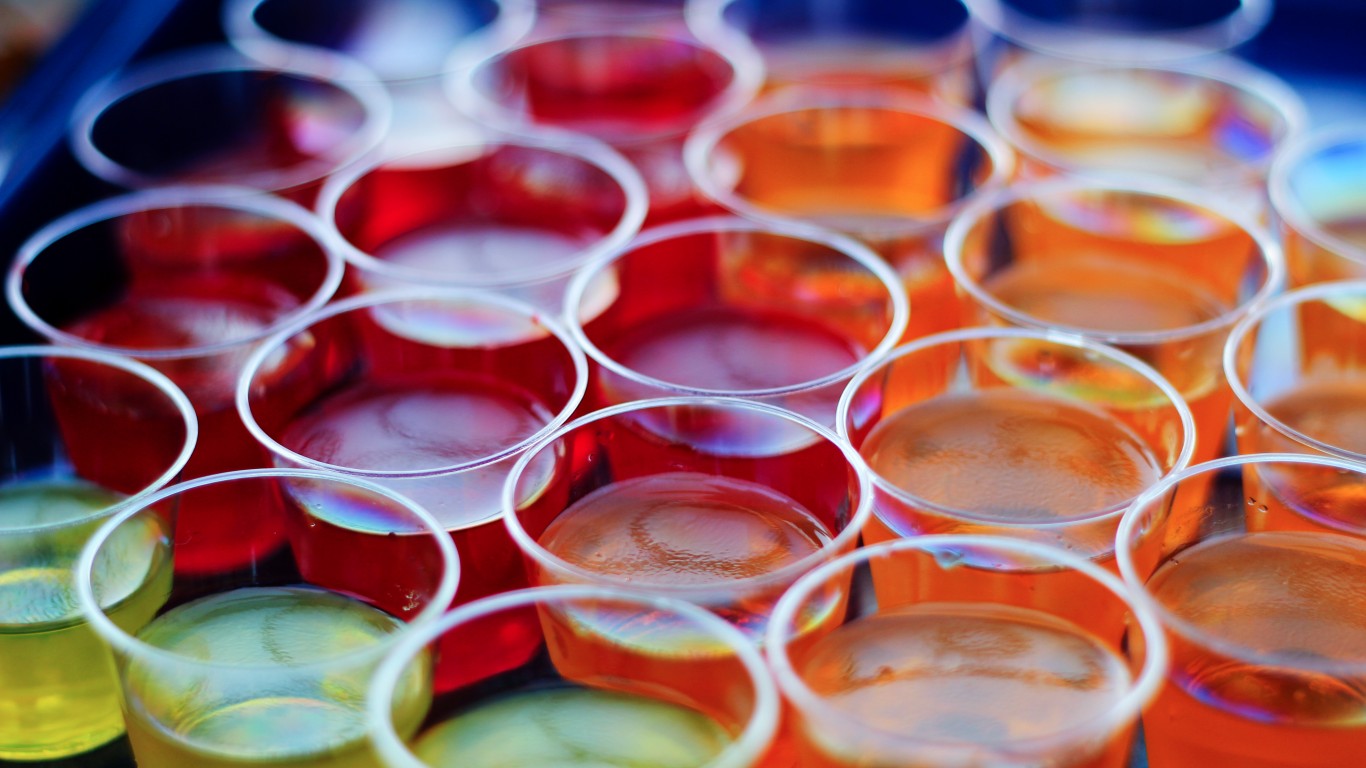
Utah: Jell-o shots
You know that a largely Mormon state isn’t going to have an official cocktail (the Church of Latter Day Saints eschews alcohol), but Utah is the country’s largest consumer of Jell-O per capita, and as of 2001, the wobbly confection has been the Official State Snack. That’s wholesome enough — but college kids will be college kids, so guess what some of them do with Jell-O.
[in-text-ad-2]

Vermont: Old Vermont
Almost half of the nation’s maple syrup production comes from Vermont, and people can only eat so many pancakes and waffles, so it’s not surprising that somebody would come up with a way to involve it in a cocktail. A relative of the Old Fashioned and the Gimlet, this is a gin-fueled affair involving not just the syrup but also fresh orange and lemon juice and a dash or two of bitters to counterbalance the sweetness. Its origins are unknown, but it got a boost in popularity when Bobby Flay featured it on a Vermont-based episode of “Brunch at Bobby’s.”
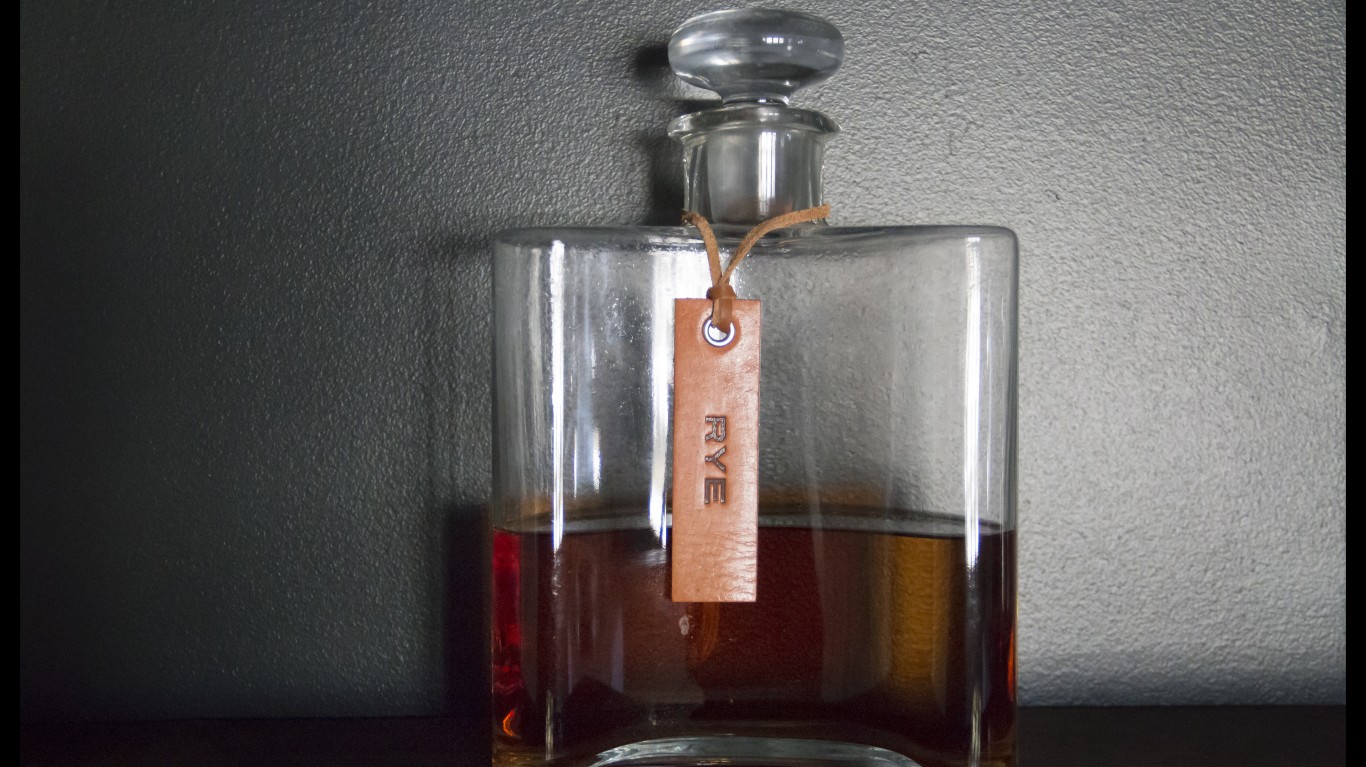
Virginia: George Washington’s Rye Whiskey
The Commonwealth’s official spirit is this unaged rye (in fact made with 60% rye, 35% corn, and 5% barley), produced according to a late 18th-century recipe at a reconstructed distillery that stood on the grounds of our first president’s Mount Vernon estate. It’s made by 18th-century methods, with the grain processed by a water-powered gristmill constructed under the direction of Washington himself.
[in-text-ad]
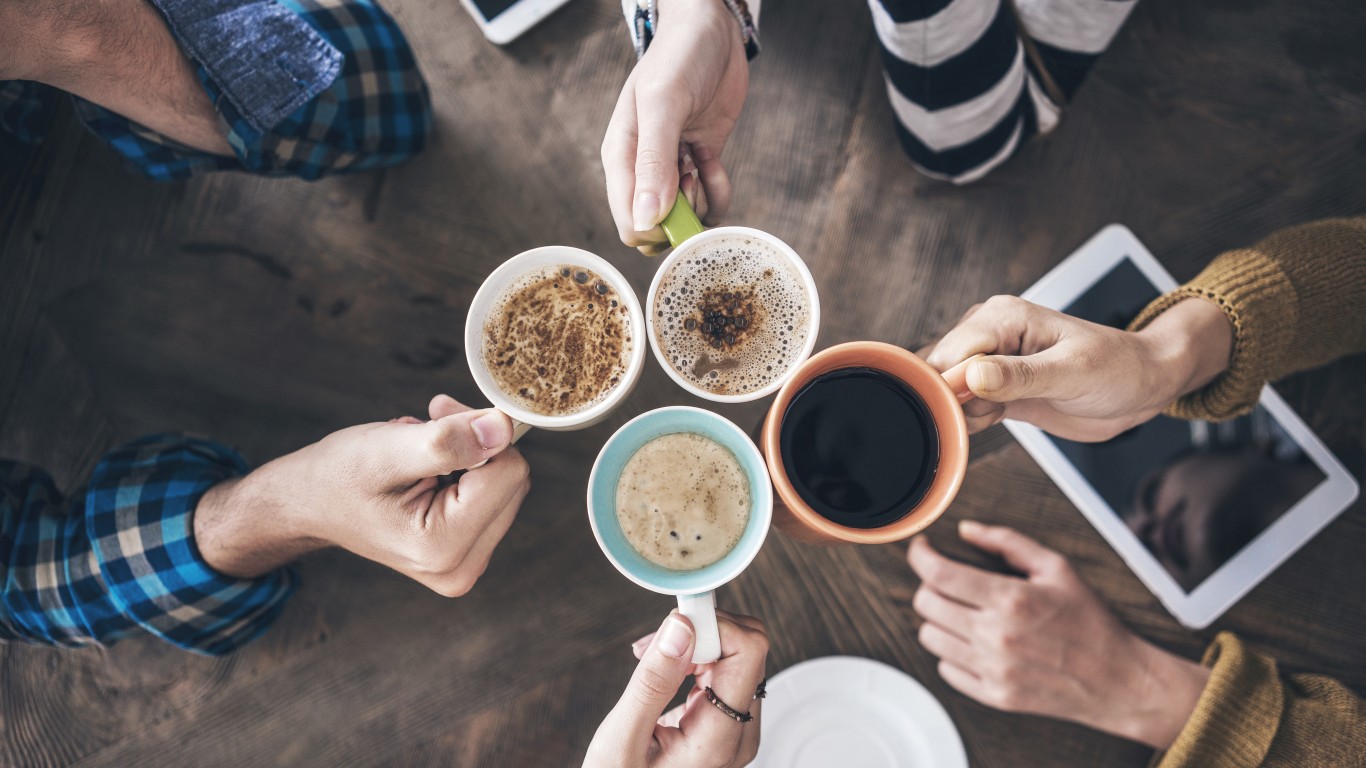
Washington: Coffee
One word alone should establish why coffee is this state’s signature drink: Starbucks. Washington is not the country’s most caffeinated locale (that honor goes to Vermont), but its major city, Seattle, pours down more coffee than any other city in America, with an estimated 35 coffee shops for every 100,000 residents (no wonder they’re sleepless). And Seattle’s famed java-centric chain has taken coffee culture to a whole new level around the country and in ever-increasing foreign locations as well.
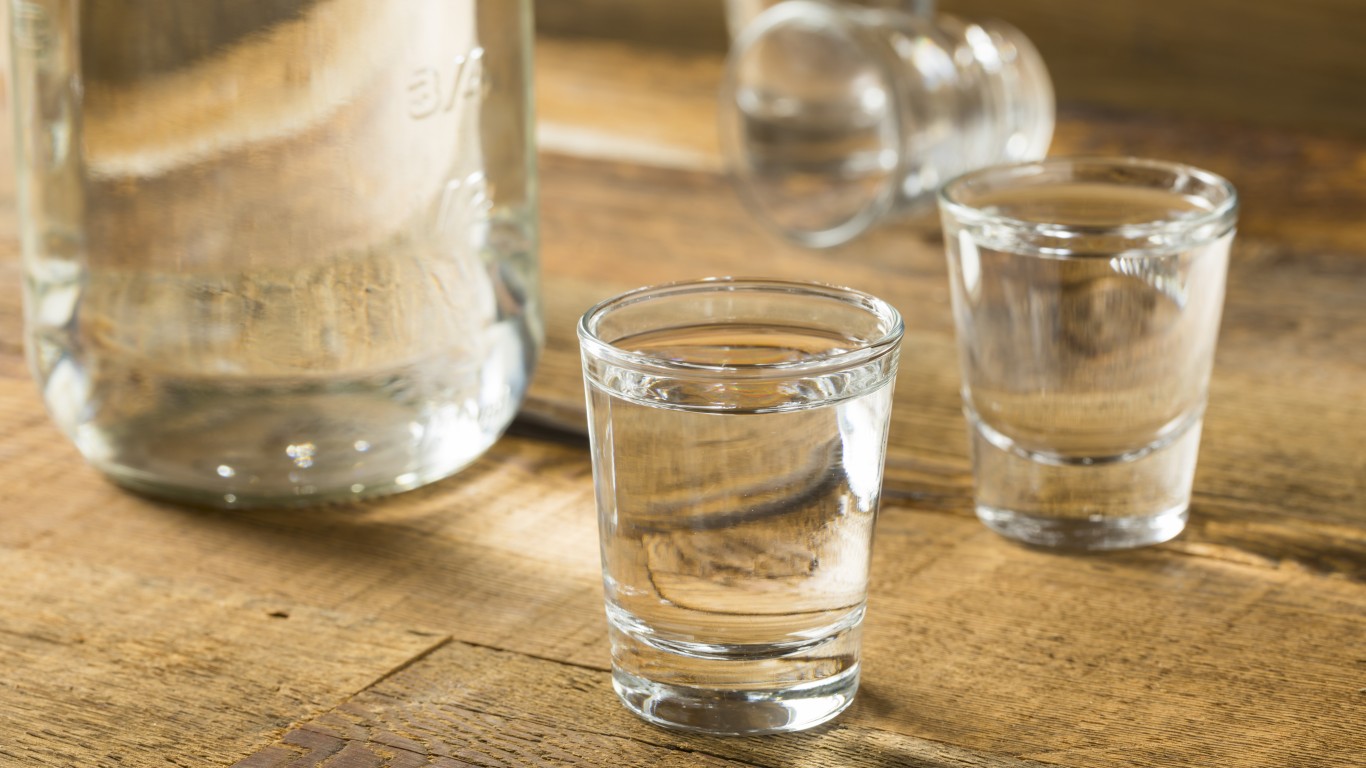
West Virginia: Moonshine
Moonshiners — men and sometimes women who distill strong spirits illegally (often working at nighttime, by the light of the moon, giving them their name) — have been a part of life in the South and elsewhere in the country since Colonial times. While no state holds a monopoly on moonshining, it has long been particularly identified with West Virginia. The famous feuding Hatfields (of Hatfield-McCoy fame) were West Virginia moonshiners — and National Moonshine Day is observed in the state with relish. Today there are a number of legal producers of “white lightning” in the moonshine style, with names like Stink Hollow Spirits, Forks of Cheat, and, yes, Hatfield & McCoy.
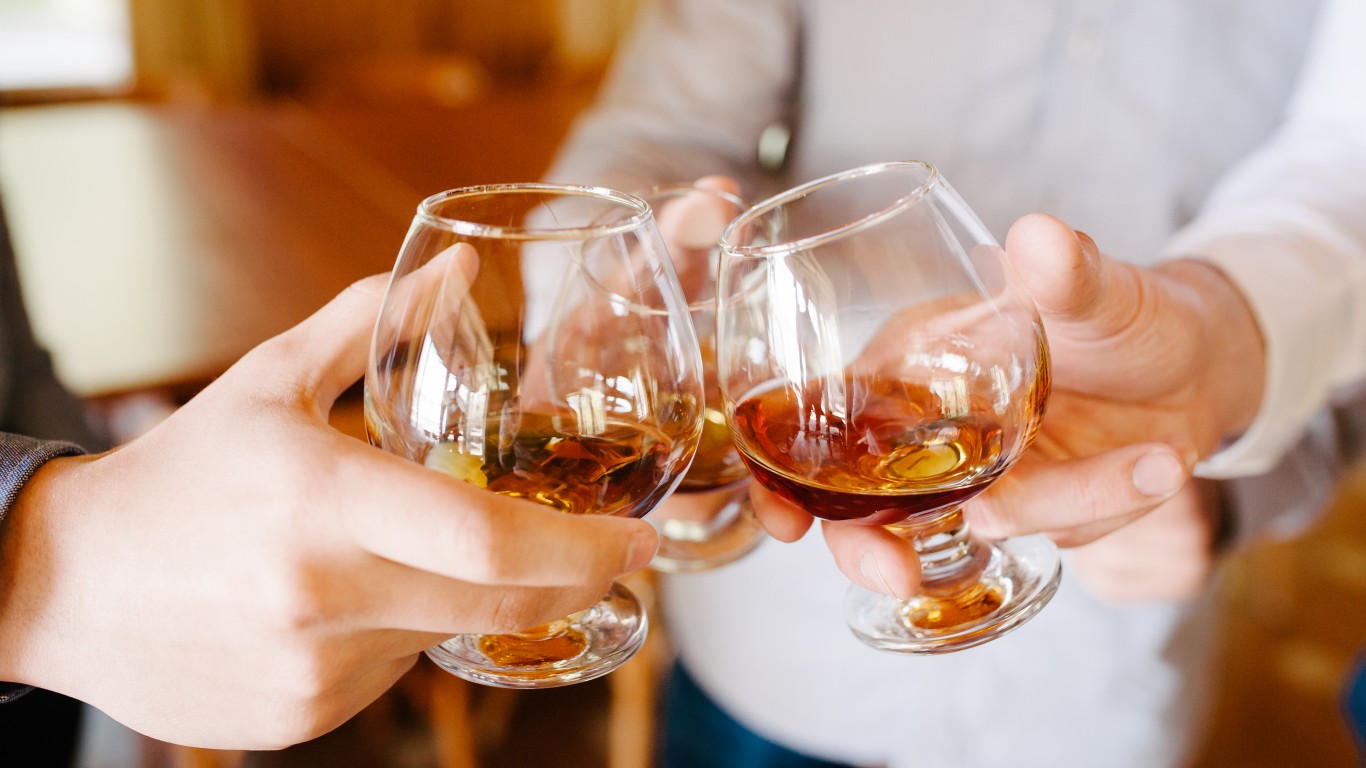
Wisconsin: Brandy
Americans across the land drink lots of bourbon,scotch, vodka, and other spirits, but serious brandy consumption is concentrated in the so-called “Brandy Belt” of Wisconsin, Minnesota, and northern Michigan. Wisconsin is apparently the leader among the three, consuming more brandy by volume than any other state — more than the other 49 states combined, if you believe some sources. California’a Korbel, the country’s largest brandy producer, reported in 2019, that of 272,869 cases released that year, 148,041 cases were sold in the Badger State.
[in-text-ad-2]
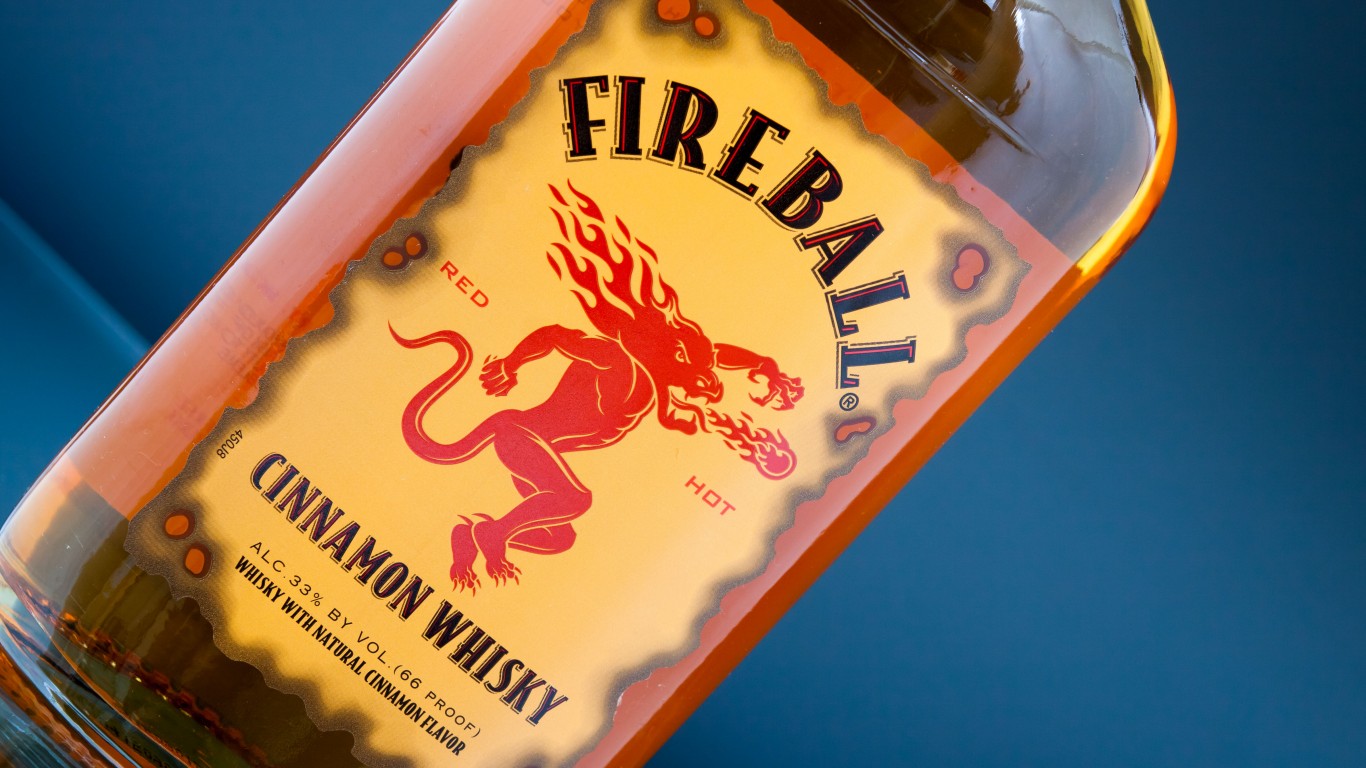
Wyoming: Fireball whisky
This cinnamon-flavored Canadian whisky is said to be the favored spirit in at least a dozen states — but according to Cheyenne-based KING-FM radio, Wyoming has “a strange affinity” for it. The station has reported a number of criminal incidents, including public indecency and firearms violations, directly related to Fireball. And five years ago, when Fireball’s makers introduced the Firebox — two 1.75-liter pouches of the stuff in a cardboard container — KING noted that it “has just combined two of Wyoming’s favorite things: Fireball whisky and booze in a box.”
The Average American Is Losing Their Savings Every Day (Sponsor)
If you’re like many Americans and keep your money ‘safe’ in a checking or savings account, think again. The average yield on a savings account is a paltry .4% today, and inflation is much higher. Checking accounts are even worse.
Every day you don’t move to a high-yield savings account that beats inflation, you lose more and more value.
But there is good news. To win qualified customers, some accounts are paying 9-10x this national average. That’s an incredible way to keep your money safe, and get paid at the same time. Our top pick for high yield savings accounts includes other one time cash bonuses, and is FDIC insured.
Click here to see how much more you could be earning on your savings today. It takes just a few minutes and your money could be working for you.
Thank you for reading! Have some feedback for us?
Contact the 24/7 Wall St. editorial team.
 24/7 Wall St.
24/7 Wall St.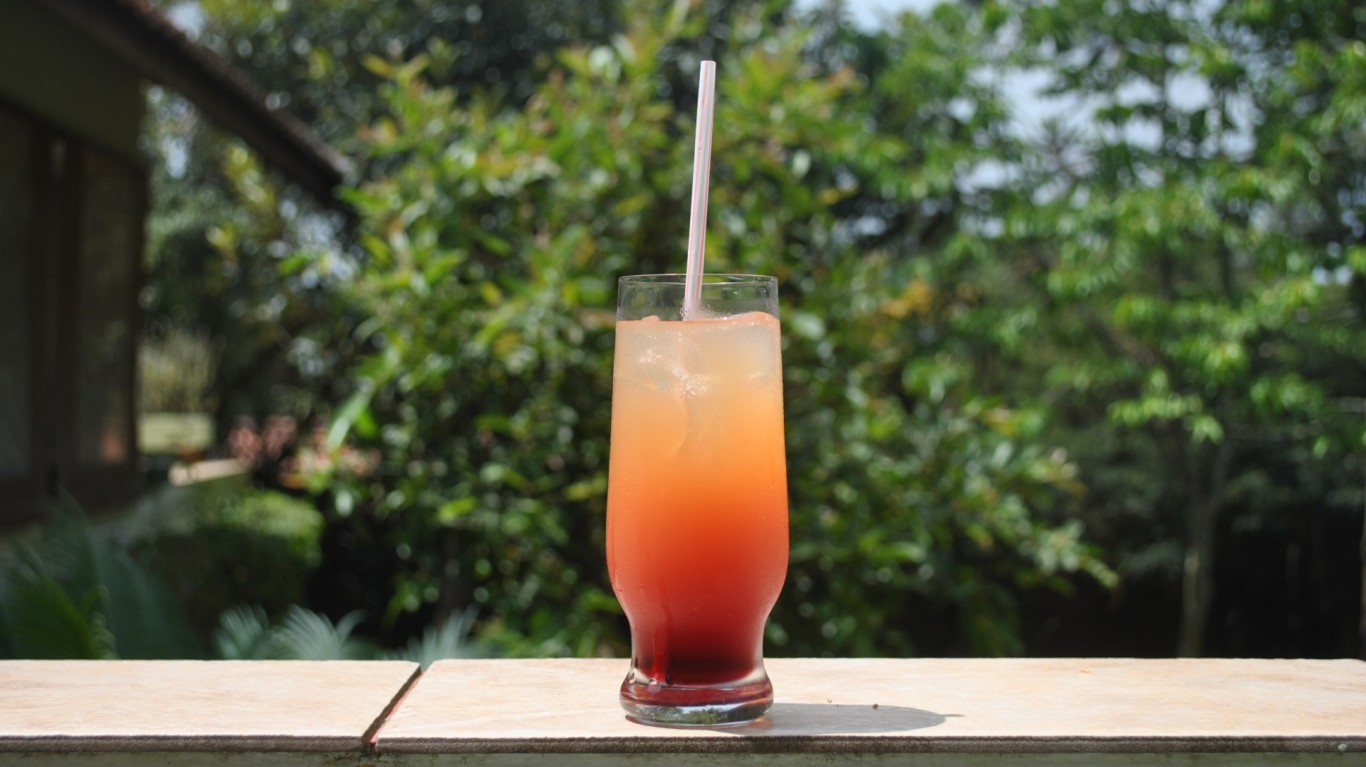
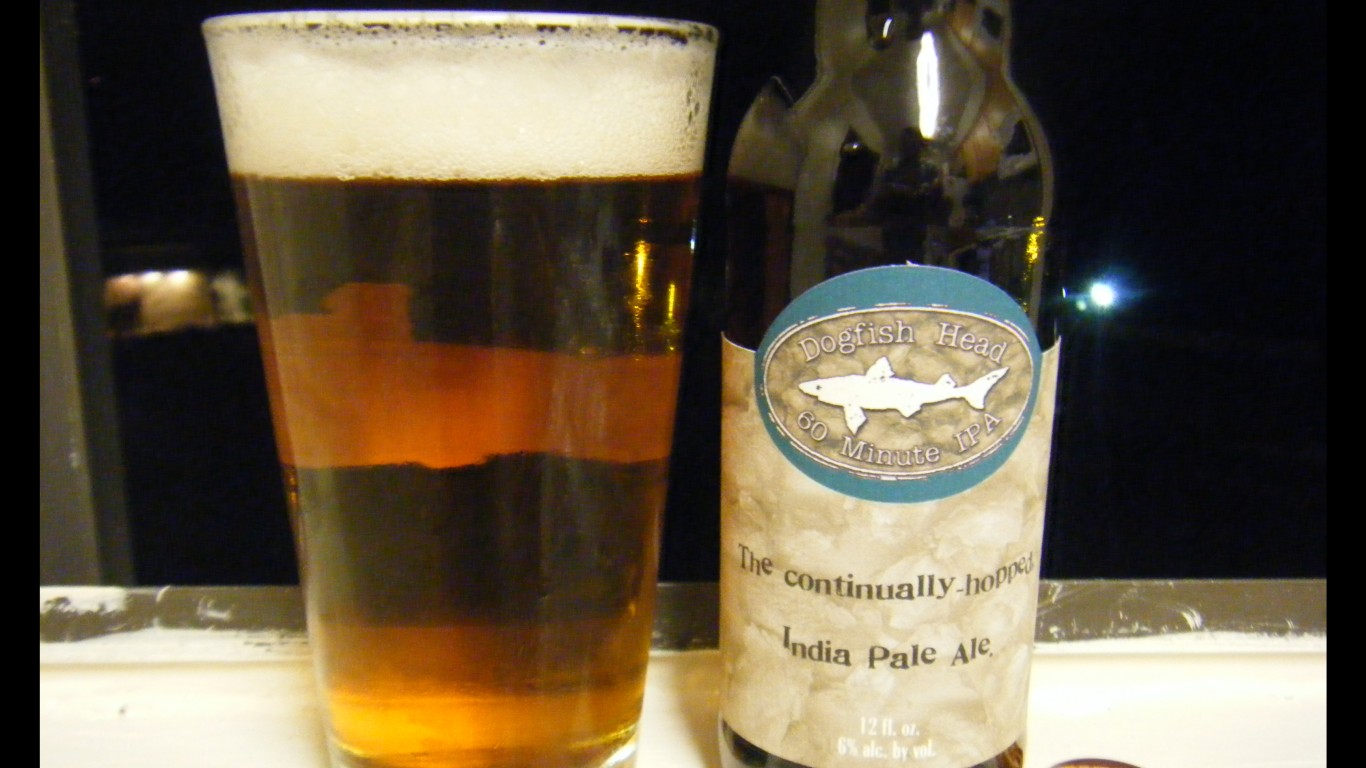
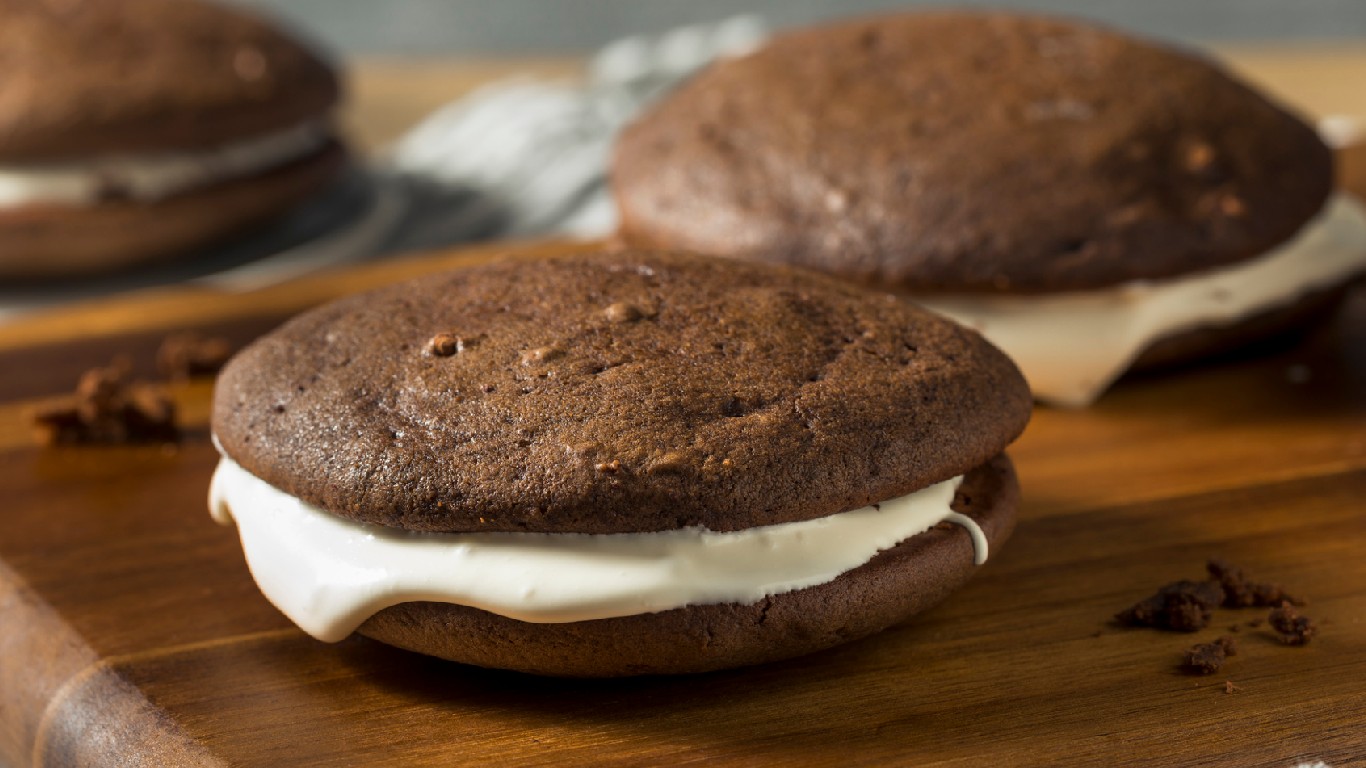 24/7 Wall St.
24/7 Wall St.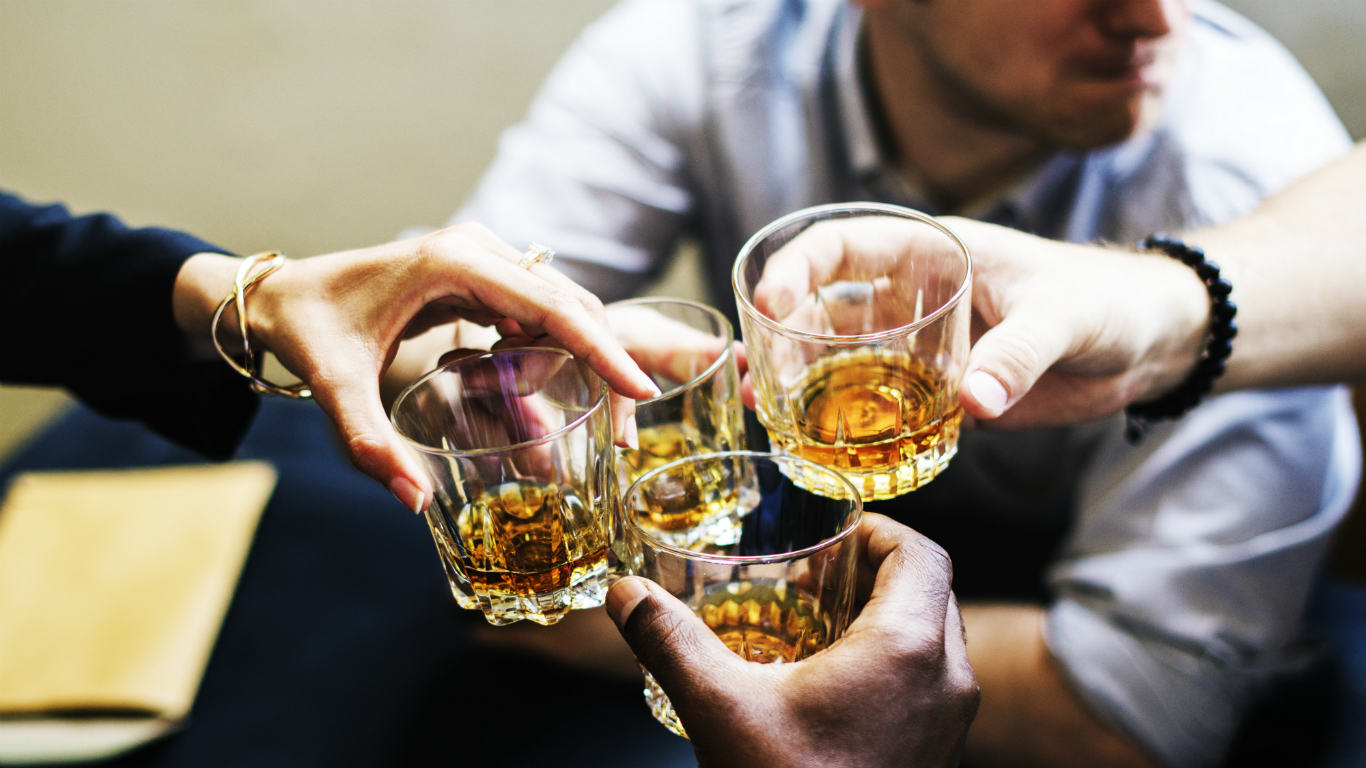 24/7 Wall St.
24/7 Wall St.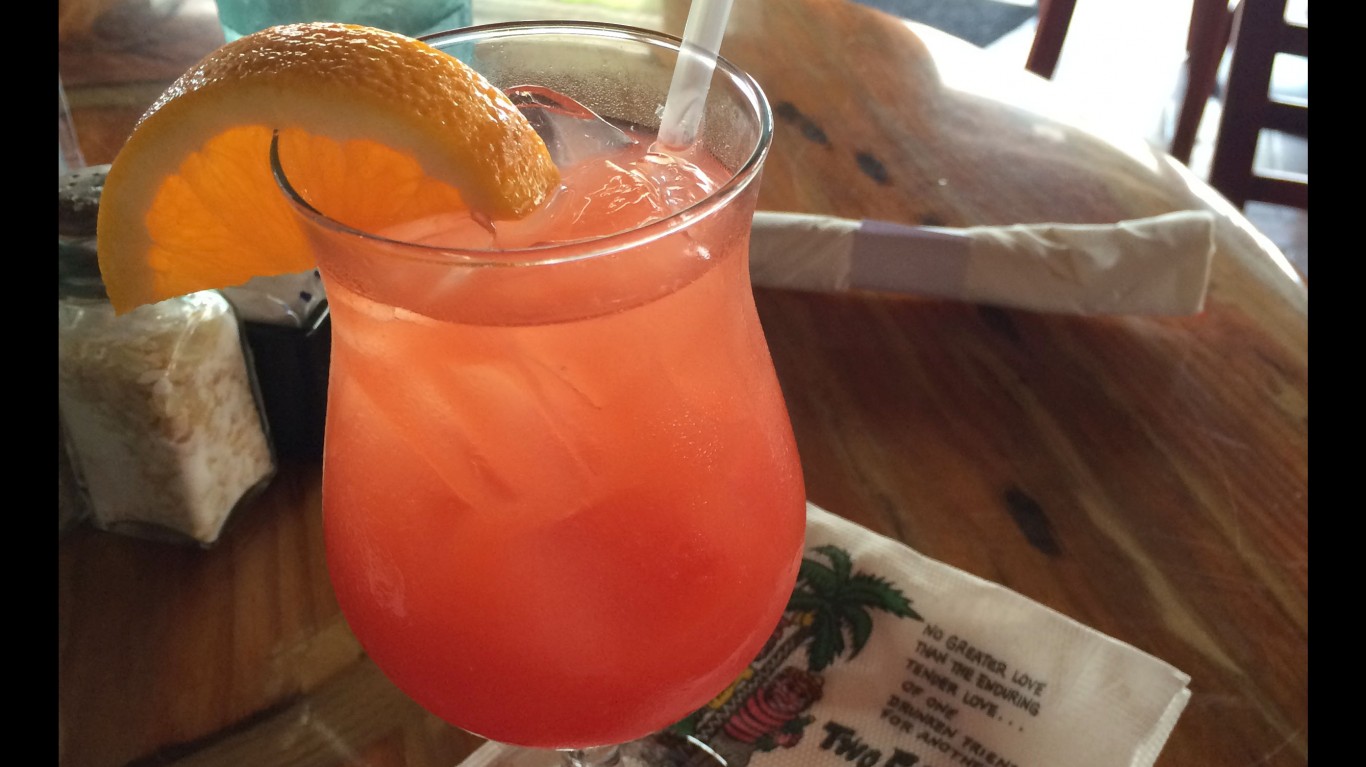
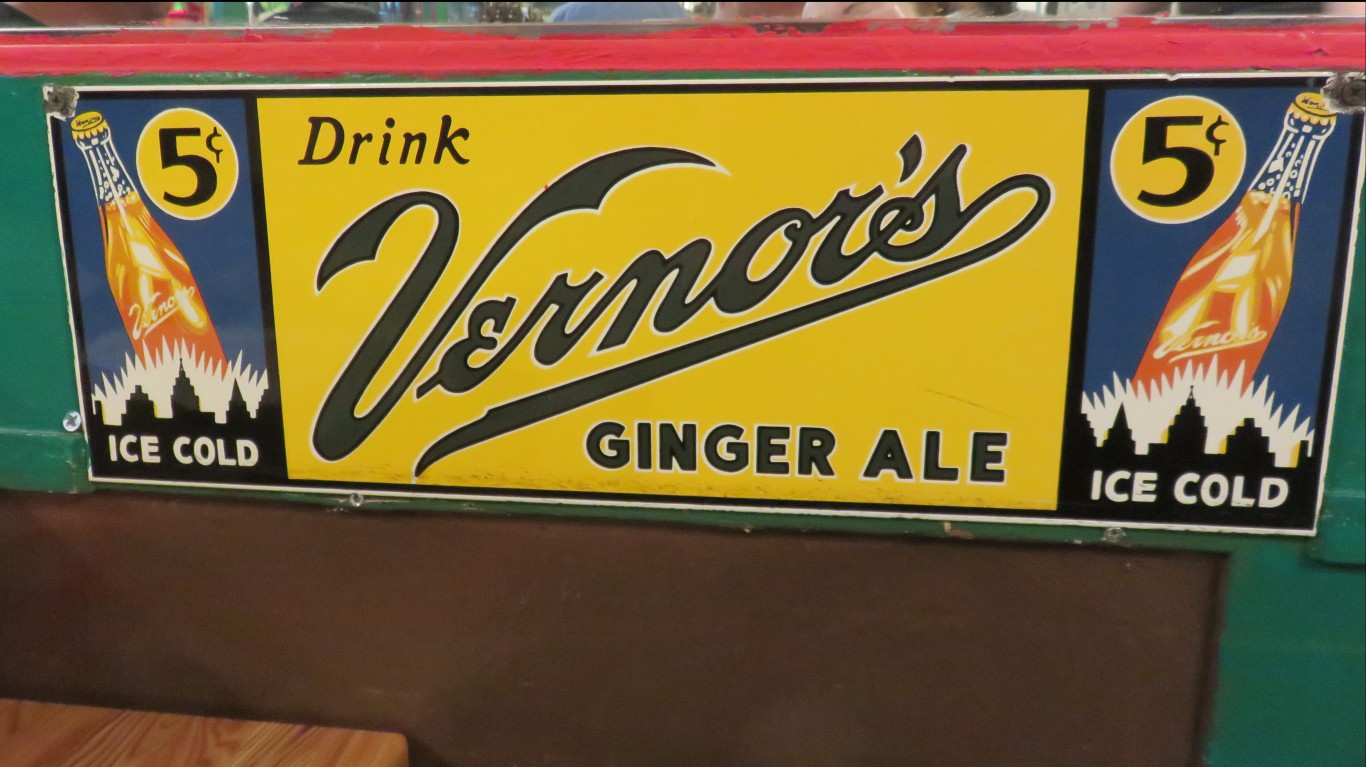
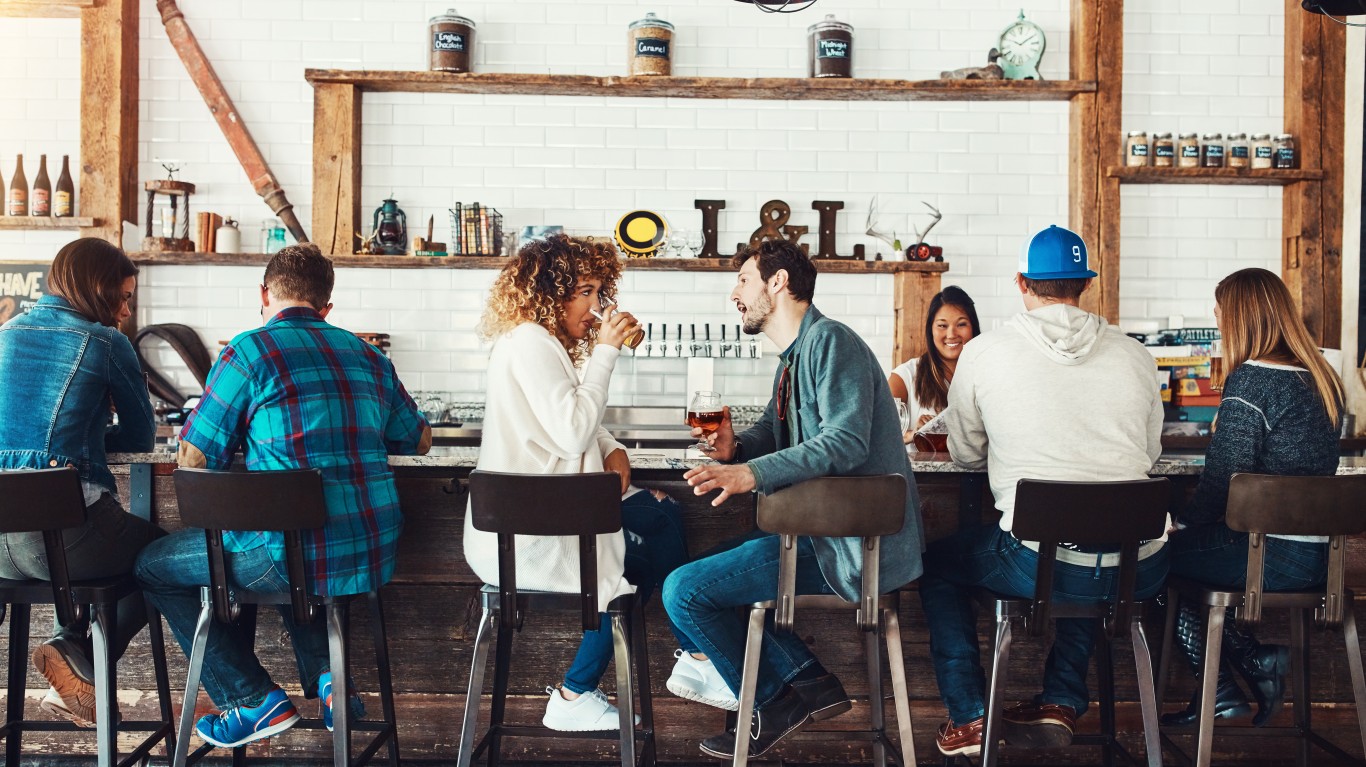 24/7 Wall St.
24/7 Wall St.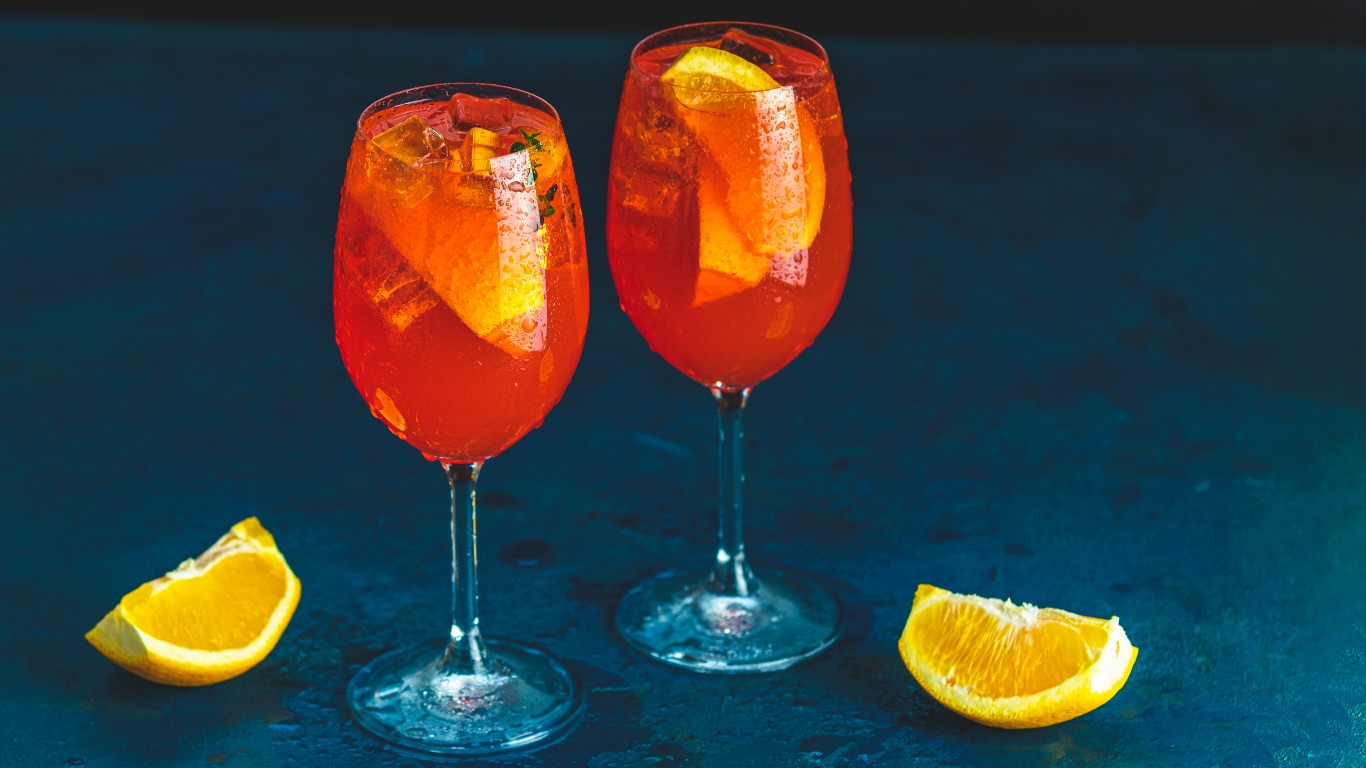 24/7 Wall St.
24/7 Wall St.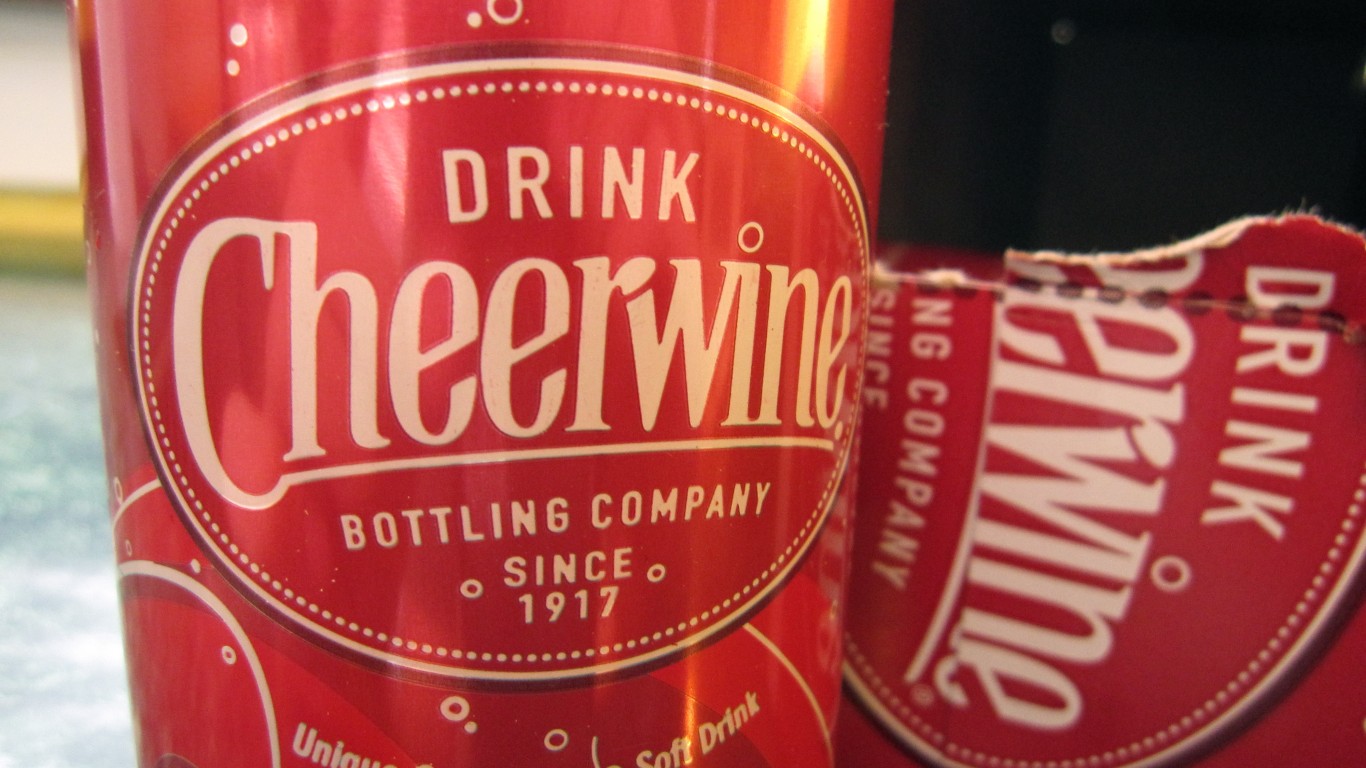
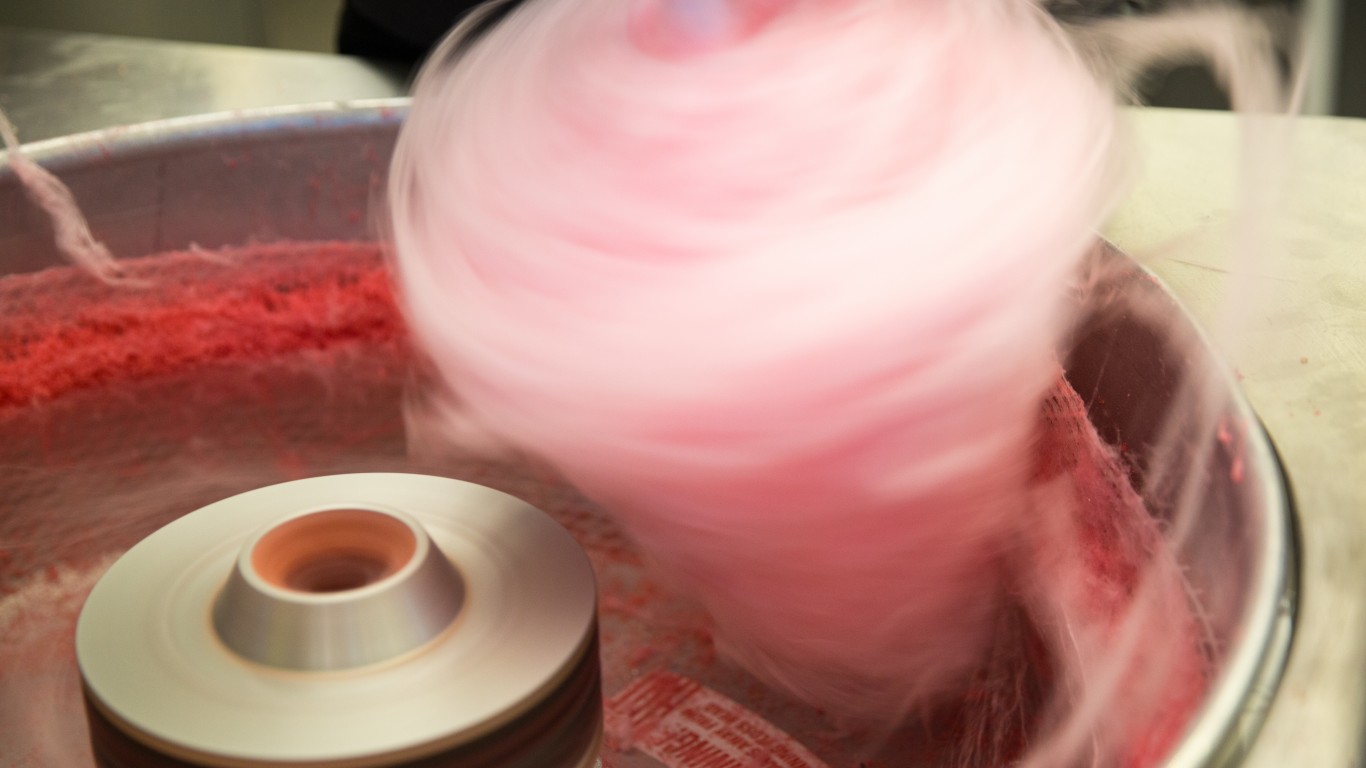 24/7 Wall St.
24/7 Wall St.